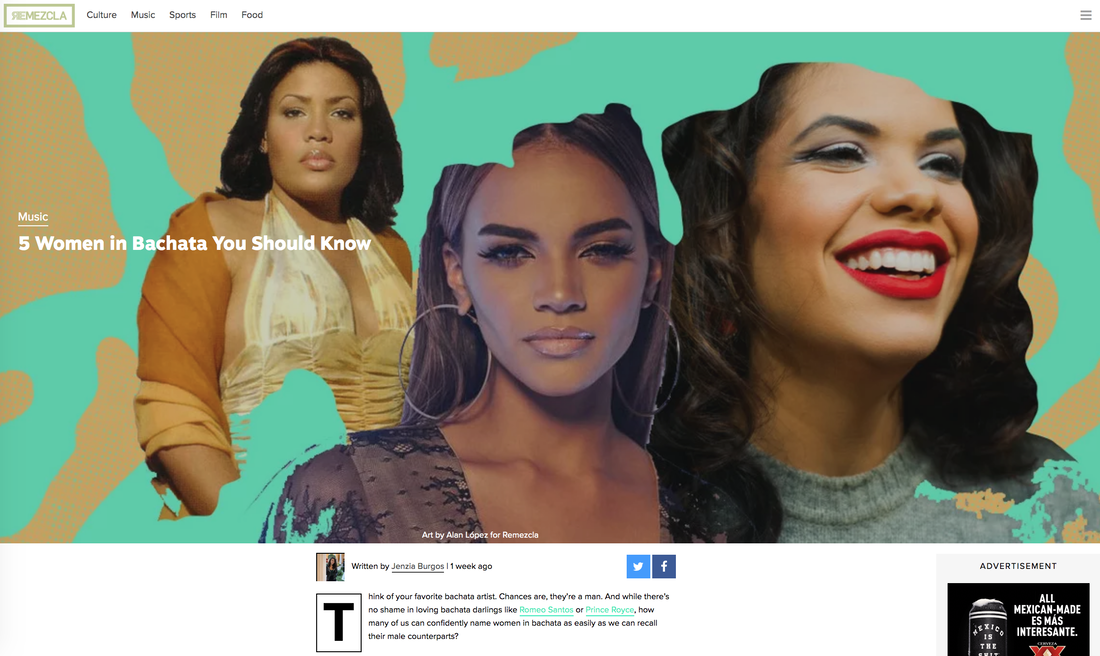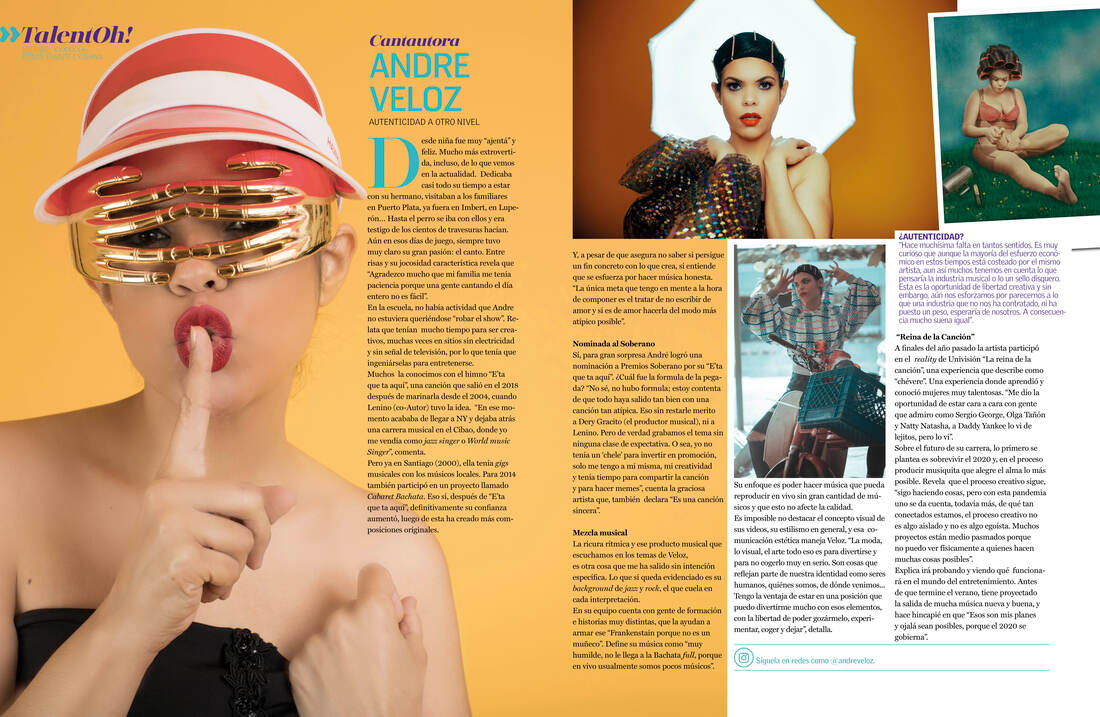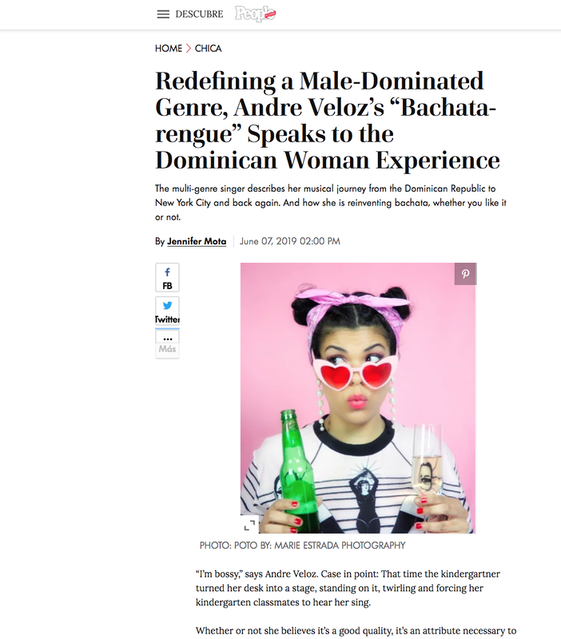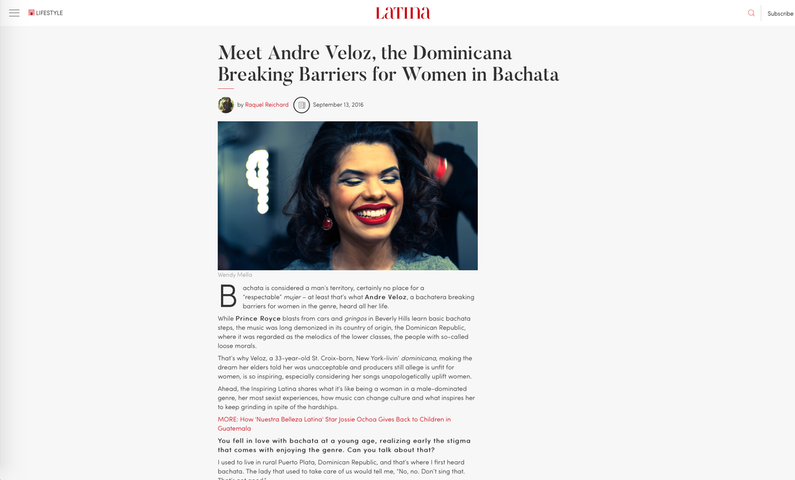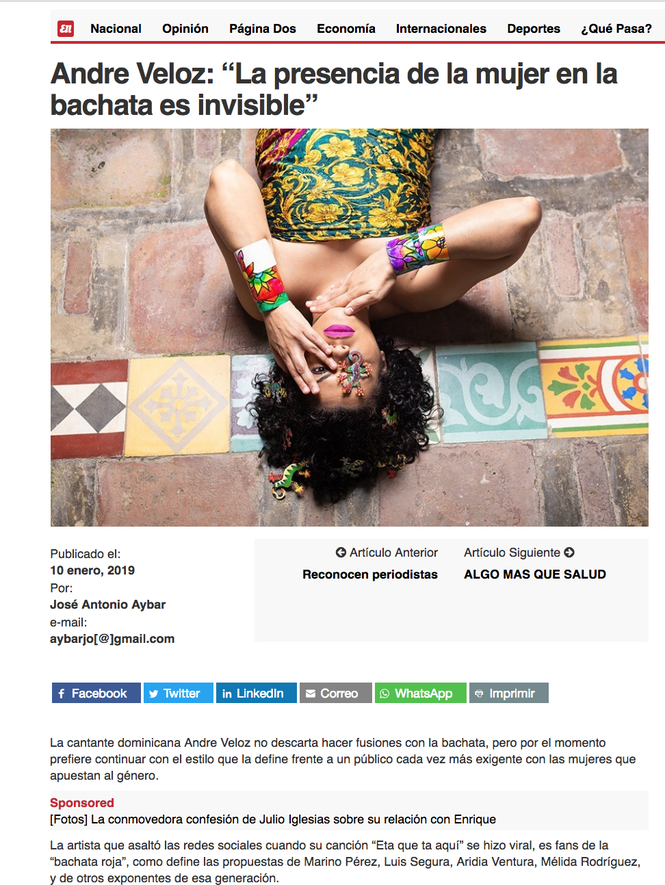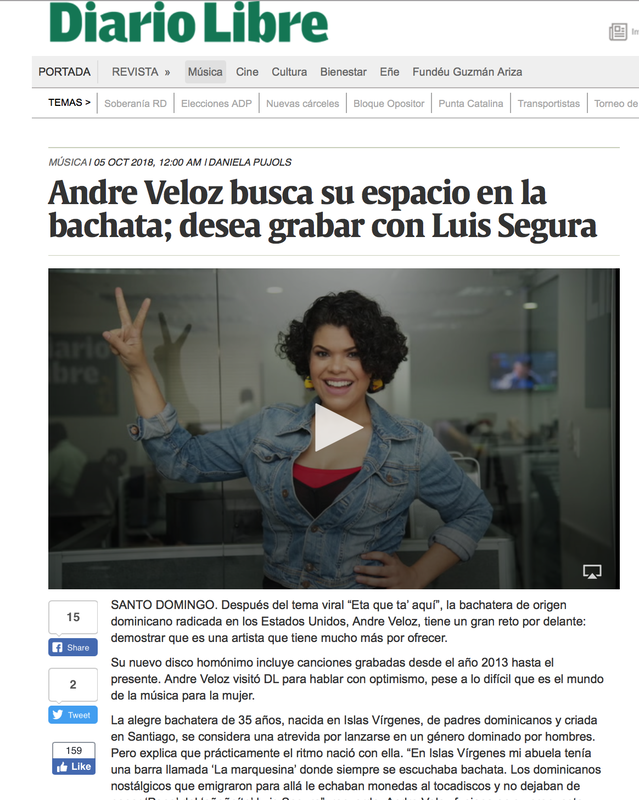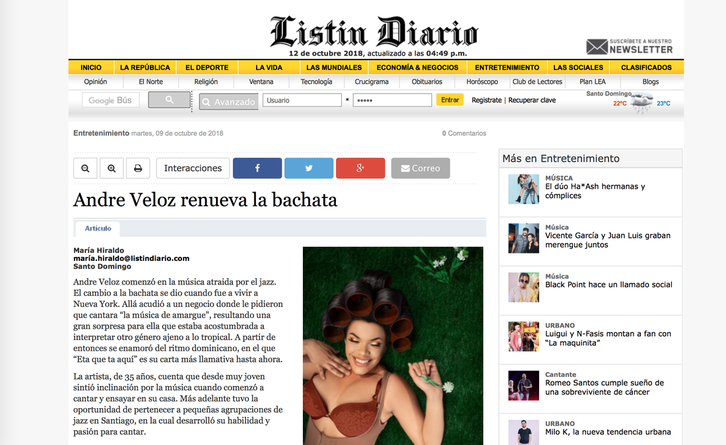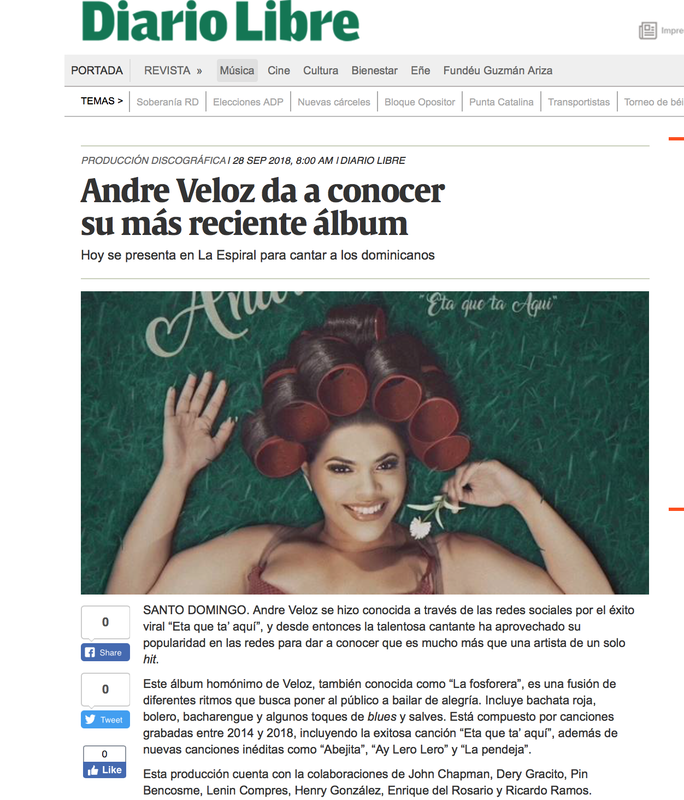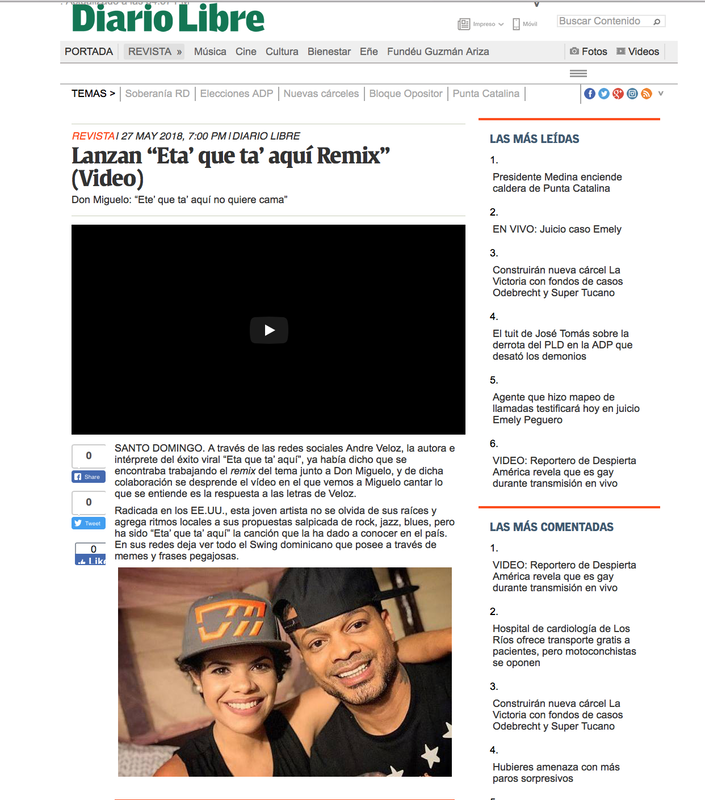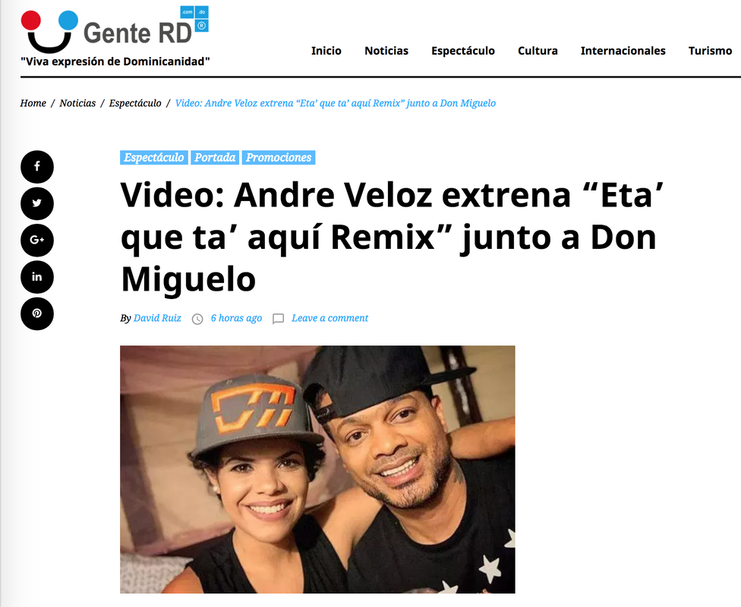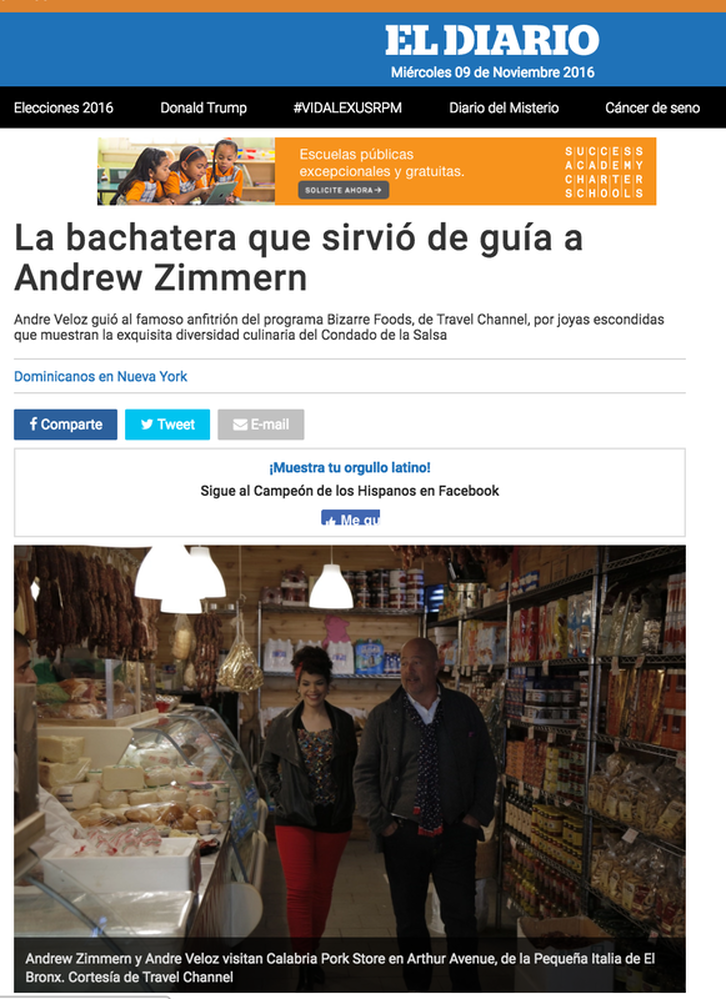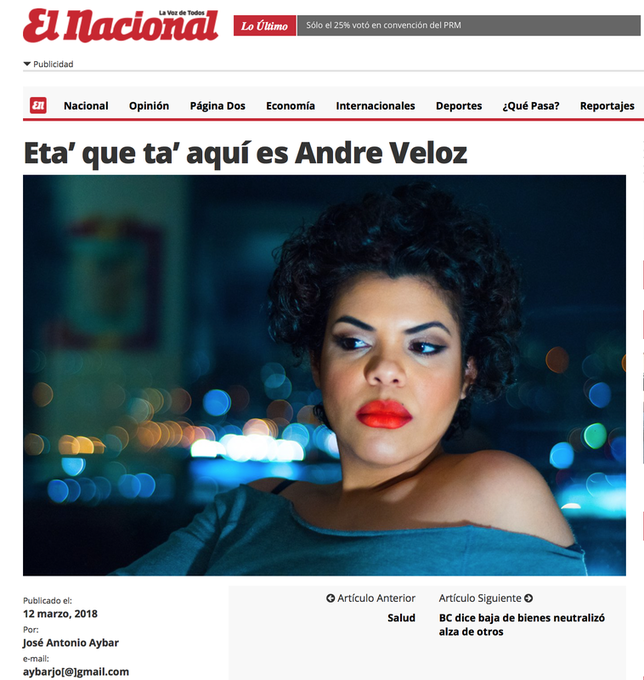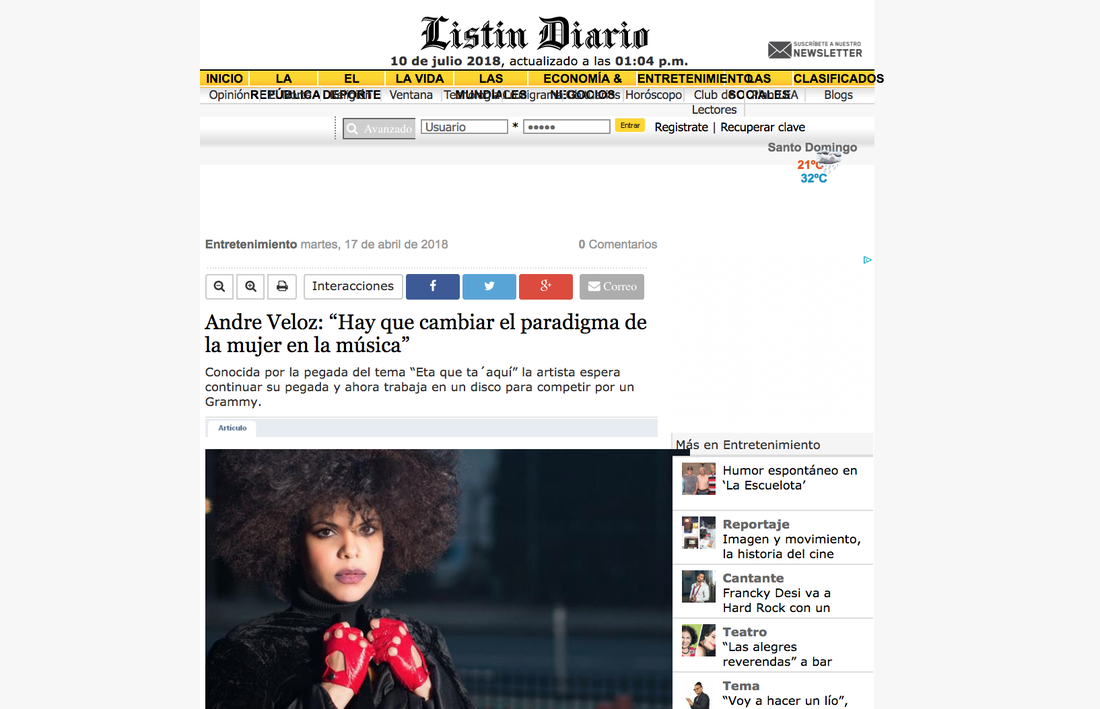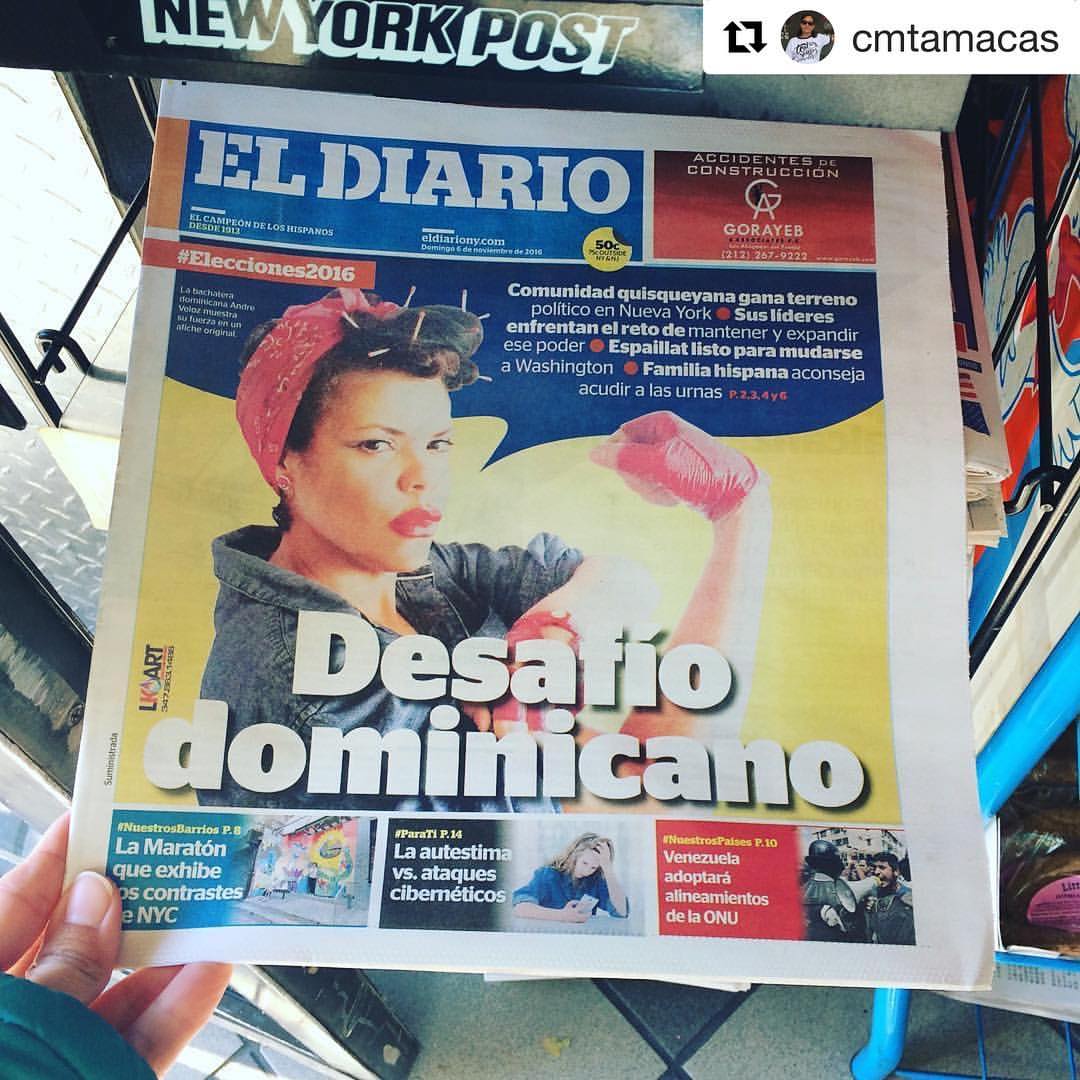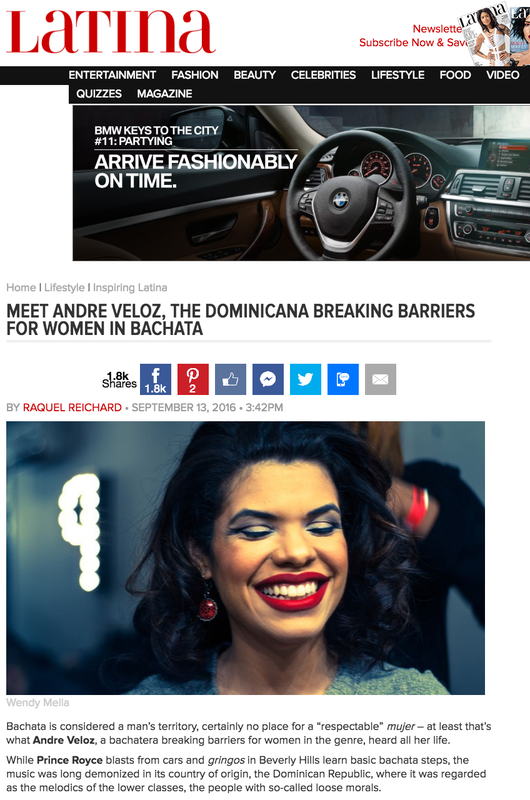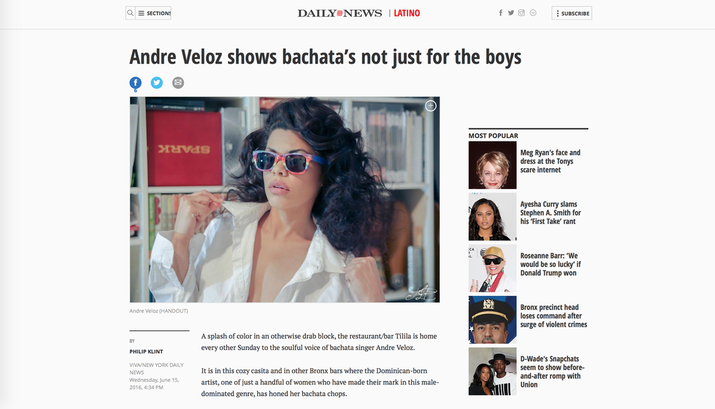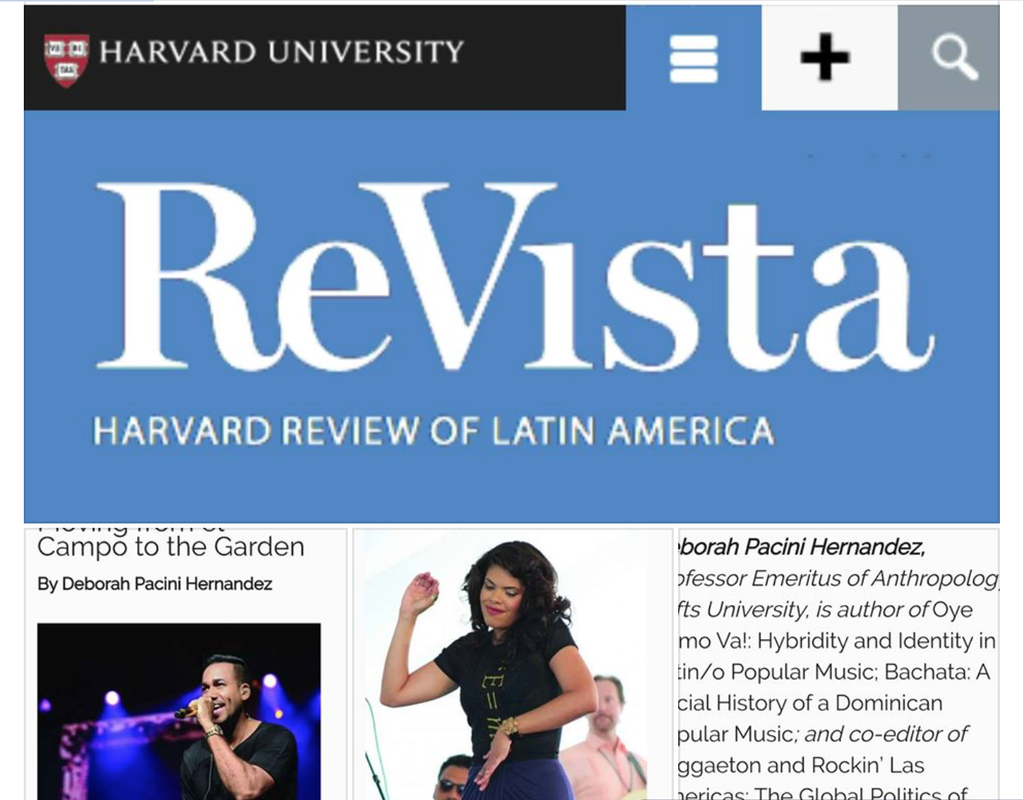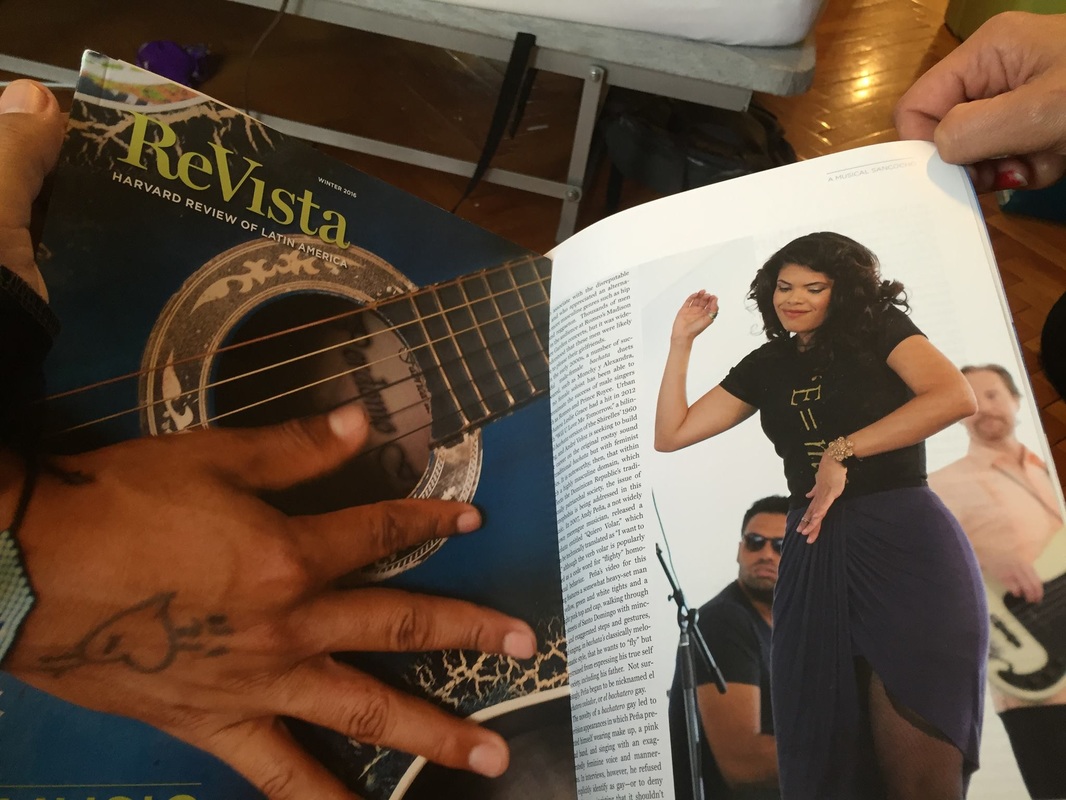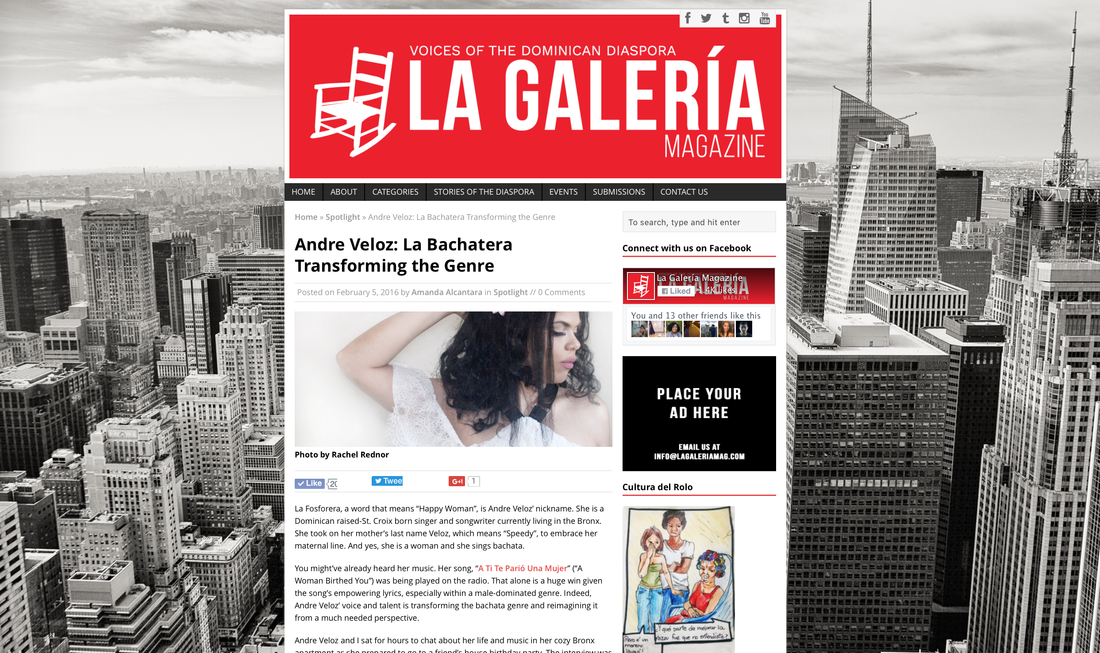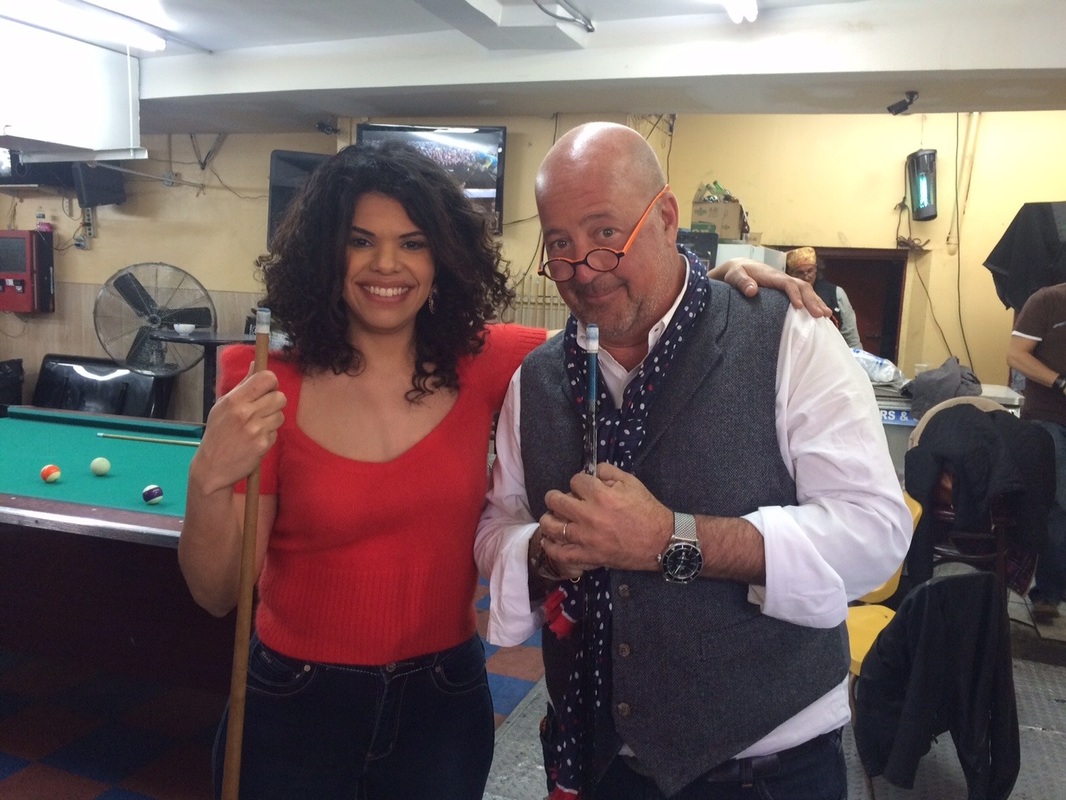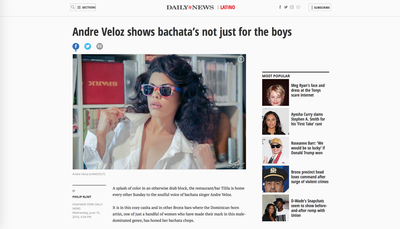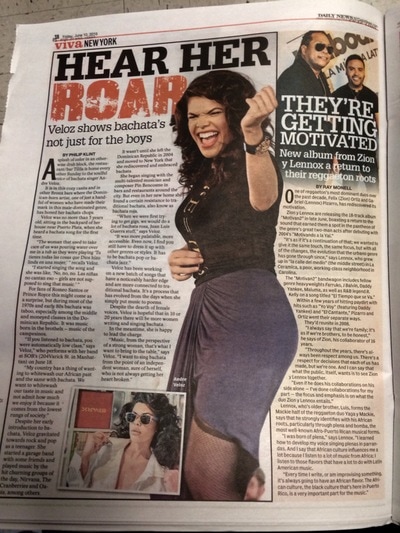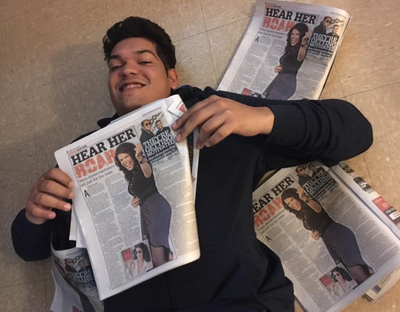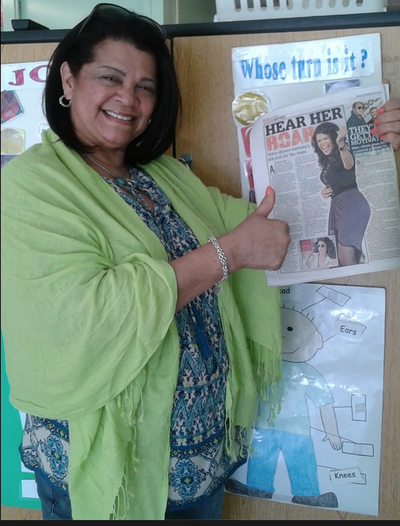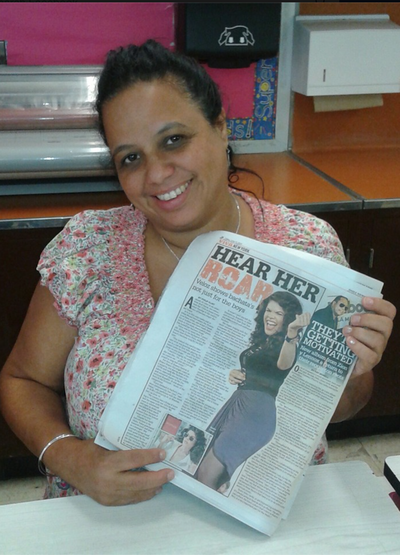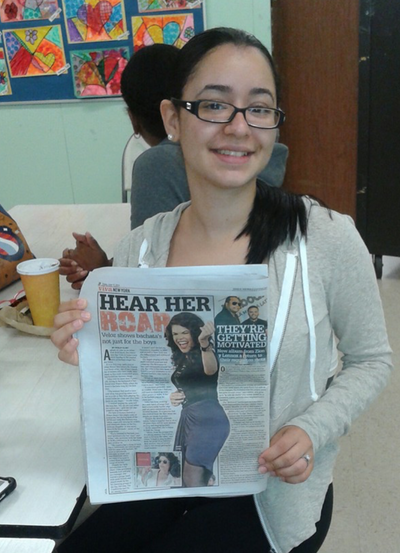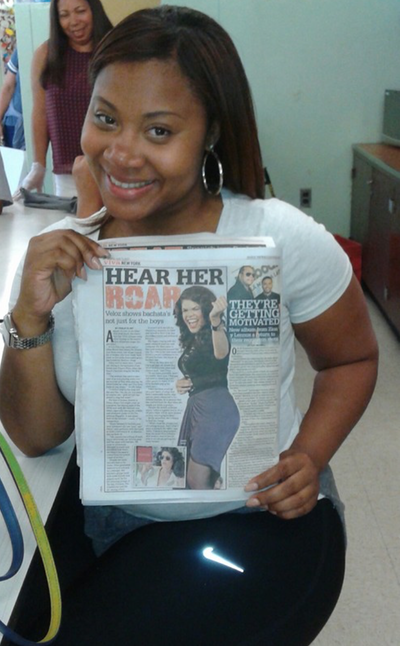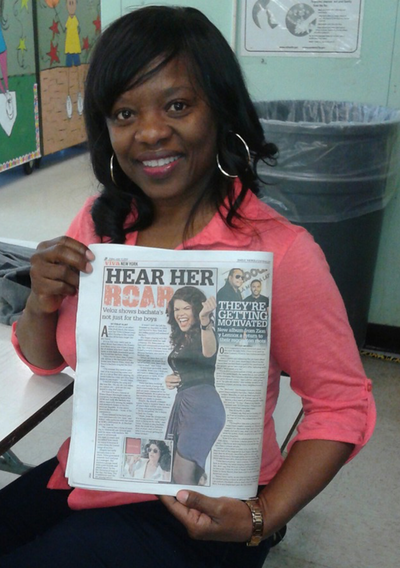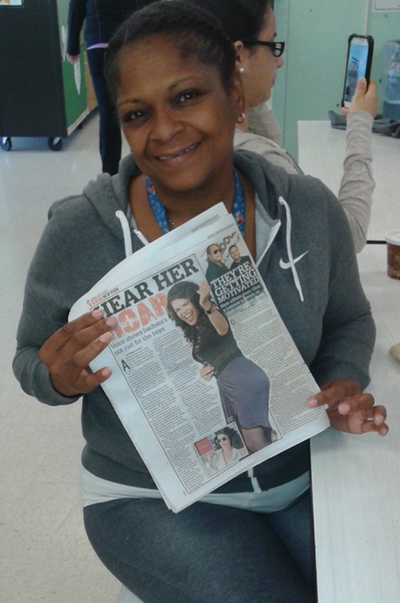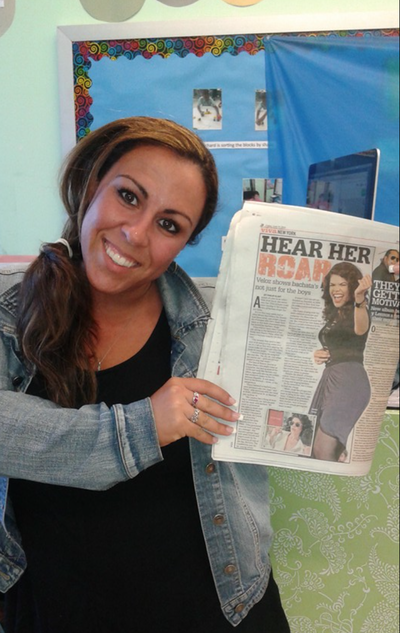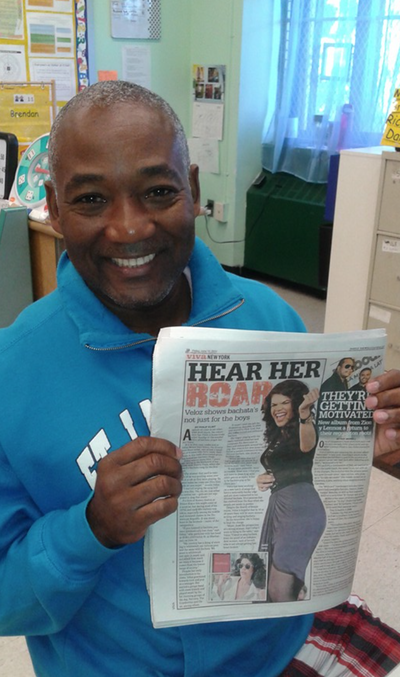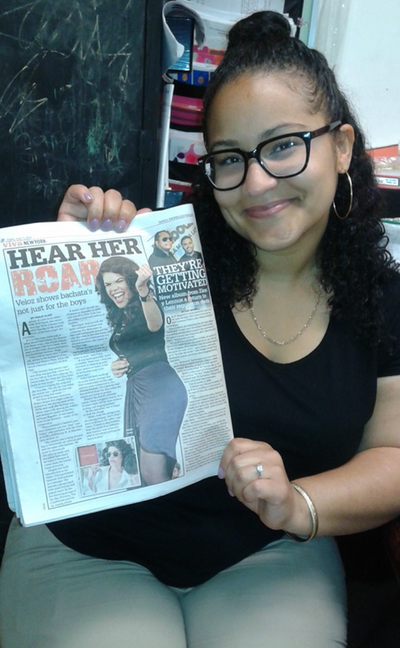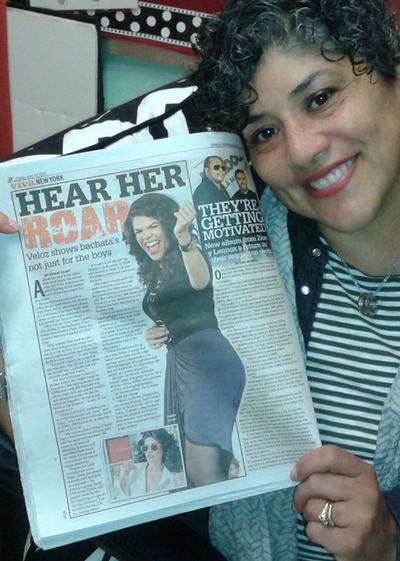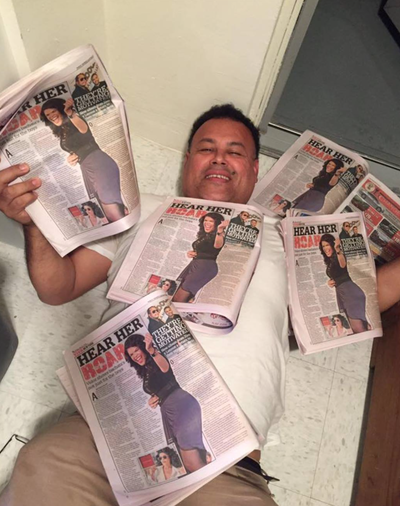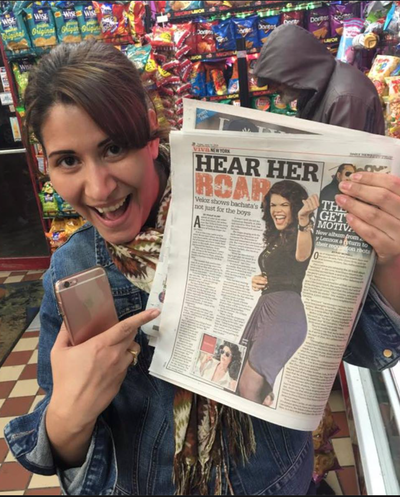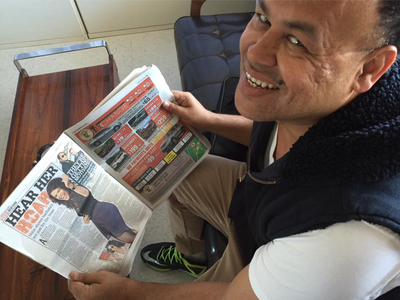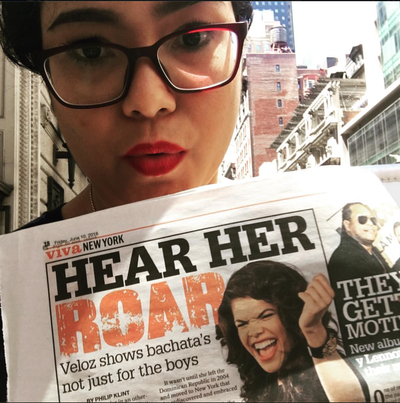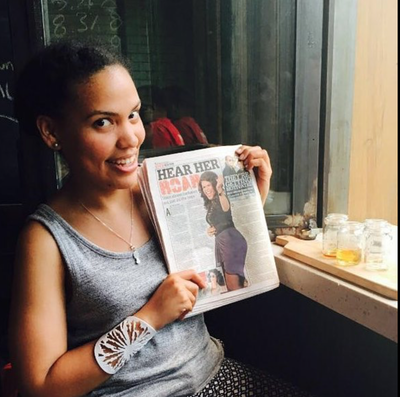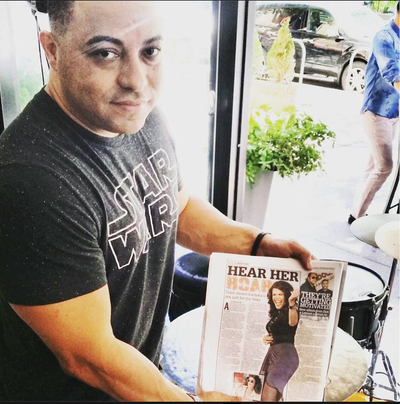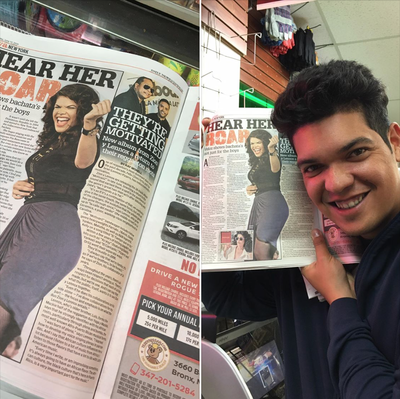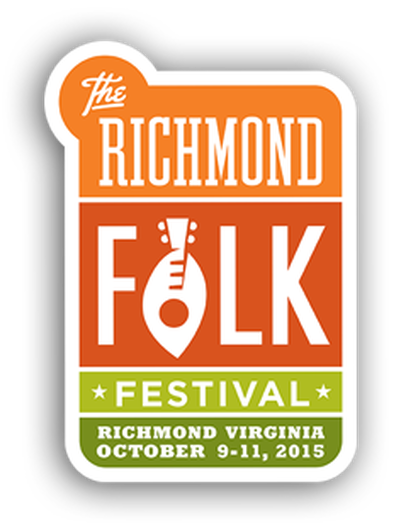Entrevista de Andre Veloz para Remolacha.net
Eta’ que ta’ aquí es Andre Veloz
José Antonio Aybar
El Nacional, Republica Dominicana
Marzo 12, 2018
Que una canción se convierta en viral a pesar de estar divorciada de la orgía musical vulgar y desechable de estos tiempos, es como para llamar la atención de quienes tienen derecho a mejores opciones.
Es lo que ha pasado con Eta’ que ta’ aquí, canción que no pretende un discurso filosófico sí destaca uno que refleja la idiosincrasia del pueblo llano.
Andre o André Veloz (las reglas de acentuación no le quitan el sueño), es la intérprete de esta canción de letras sencillas y ritmo contagioso que anda de boca en boca en calles, casas y oficinas.
Andre nació en los años 80 en St. Croix, Islas Vírgenes y se crió entre el Bronx y Santiago de los Caballeros, combinación social que da sentido y sabor a su propuesta musical cuya base se sustenta en la bachata de pueblo.
Es hija de los dominicanos Dulce Hiraldo, abogada que rehizo su vida en Nueva York y hoy día trabaja en una escuela del Bronx, mientras su padre, Luis José Martínez, reside y trabaja en Las Canas, Luperón, Puerto Plata.
Desde pequeña su tío Lisfredys Hiraldo Veloz, abogado de profesión, ha sido la figura paterna que estuvo y está en los momentos claves de la vida personal y profesional de Andre, una artista sin poses de diva, segura de lo que quiere y comprometida con su carrera.
¿Dónde naciste y cuándo? (no tienes que poner año)
Nací en los 80’s en St. Croix, Islas Vírgenes. Mi abuela residía y tenía su negocio allá, y por la conveniencia que trae nacer con doble ciudadanía fui a nacer en Christiansted.
¿A qué edad te trajeron a RD?
Me llevaron inmediatamente a “Erredé”. Mis primeros años fueron en Santiago y de ahí mi vida fluctuaba entre Imbert, Las Canas y Santiago. Ya como a eso de los 8 años me mudé definitivamente a Santiago.
¿Cuándo inicias tu vida en Estados Unidos?
Decidí mudarme a los Estados Unidos ya de adulta. Tenía 21 años y aquí recomencé todo de cero. Universidad, trabajos, todos los elementos de una vida adulta y normal ¡Pero qué va! La música es lo mío.
¿De dónde te viene la vena artística?
Mami dice que como ella no tenía para pagar niñera, a mí me cuidaba un radio con un cassette de Juan Gabriel. Y que antes de yo aprender a hablar ya cantaba. Es una historia bonita y me gusta pensar que es verdad, jajajajaja. Papi, dibuja también, pero en general creo que vengo de una familia muy musical y muy alegre. Te estoy hablando de que de niña a mí me gustaban los sábados, porque yo sabía que eran días de “echar agua” y de poner la música “A tóa”.
En conclusión, la música siempre nos rodeaba.
¿Cómo descubres esa vocación?
Yo siempre supe que quería ser cantante y creo que siempre lo he sido. En la escuela siempre me destacaba por eso mismo, porque el “performance” me llamaba y yo no lo ocultaba. Tengo la ventaja de que siempre he sabido qué es lo que amo en esta vida. Tú te imaginas la cantidad de gente que anda por el mundo sin saber a dónde van o tratando de encontrarse a sí misma. Cuando uno está en sus años formativos o es un “young adult”, Lo primero que a uno le dicen es que sea realista y que elija una carrera de verdad.
De ahí viene la parte en la que yo misma decido que ser realista no es para mí. En conclusión, si acaso, la parte más difícil para mí era aceptar yo misma, que tenía mi vocación clara, y que esto era algo bueno, contrario a lo que me dijeran.
¿Cuándo te inicias a nivel profesional?
Empiezo formalmente a los 14 años de edad, con un “garaje band” que debutó en mi fiesta de 15 años. No sonábamos bien, pero desde los 14 tengo la disciplina que conlleva tener un proyecto musical y sobre todo el liderazgo para armarlo.
¿Cómo definir tu propuesta musical?
Divertida, “playful” y también muy respetuosa de la gente que decide escuchar mis canciones. Mi música está muy enraizada en la nostalgia que yo siento por mi país ahora que no vivo allá y también en la nostalgia que siento al recordar los años en que en mi país no había malicia, sino nobleza.
¿Cuáles son tus influencias musicales?
No voy a responderla porque no acabaría hoy. Solo te digo que desde el rock, jazz, blues, a la bachata mas roja o el merengue de Fefa (Fefita la Grande).
Eta’ que ta’ aquí, sin duda se ha convertido en un éxito viral. ¿Esperabas esa reacción de la gente?
No me lo esperaba, pero sin duda es una oportunidad muy bienvenida. A mí misma me gusta mucho la canción (compuesta por Lenino y yo), es relajada en términos de relax y también del relajo, pero a su vez habla de las cosas que le pasan a uno por la cabeza cuando está cómodo en su casa.
¿Cuántas producciones discográficas?
Tengo una producción del 2014 en las plataformas digitales llamada “Cabaret Bachata”. De ahí solo he hecho “releases” como singles.
¿Cuándo vienes a RD con tu grupo?
¿Qué cuando voy? Desde que alguien me invite formalmente jajajajajajajaja. Tú sabes que el horno no está para bizcochitos y quiero ir, pero quiero ir con los cuatro jinetes de “La foforera”: John Chapman (Bass), Cunco (percusión), Pin Bencosme y Francisquito Reyes. Ir sin ellos no sería igual de divertido, así que estamos aceptando invitaciones.
Es lo que ha pasado con Eta’ que ta’ aquí, canción que no pretende un discurso filosófico sí destaca uno que refleja la idiosincrasia del pueblo llano.
Andre o André Veloz (las reglas de acentuación no le quitan el sueño), es la intérprete de esta canción de letras sencillas y ritmo contagioso que anda de boca en boca en calles, casas y oficinas.
Andre nació en los años 80 en St. Croix, Islas Vírgenes y se crió entre el Bronx y Santiago de los Caballeros, combinación social que da sentido y sabor a su propuesta musical cuya base se sustenta en la bachata de pueblo.
Es hija de los dominicanos Dulce Hiraldo, abogada que rehizo su vida en Nueva York y hoy día trabaja en una escuela del Bronx, mientras su padre, Luis José Martínez, reside y trabaja en Las Canas, Luperón, Puerto Plata.
Desde pequeña su tío Lisfredys Hiraldo Veloz, abogado de profesión, ha sido la figura paterna que estuvo y está en los momentos claves de la vida personal y profesional de Andre, una artista sin poses de diva, segura de lo que quiere y comprometida con su carrera.
¿Dónde naciste y cuándo? (no tienes que poner año)
Nací en los 80’s en St. Croix, Islas Vírgenes. Mi abuela residía y tenía su negocio allá, y por la conveniencia que trae nacer con doble ciudadanía fui a nacer en Christiansted.
¿A qué edad te trajeron a RD?
Me llevaron inmediatamente a “Erredé”. Mis primeros años fueron en Santiago y de ahí mi vida fluctuaba entre Imbert, Las Canas y Santiago. Ya como a eso de los 8 años me mudé definitivamente a Santiago.
¿Cuándo inicias tu vida en Estados Unidos?
Decidí mudarme a los Estados Unidos ya de adulta. Tenía 21 años y aquí recomencé todo de cero. Universidad, trabajos, todos los elementos de una vida adulta y normal ¡Pero qué va! La música es lo mío.
¿De dónde te viene la vena artística?
Mami dice que como ella no tenía para pagar niñera, a mí me cuidaba un radio con un cassette de Juan Gabriel. Y que antes de yo aprender a hablar ya cantaba. Es una historia bonita y me gusta pensar que es verdad, jajajajaja. Papi, dibuja también, pero en general creo que vengo de una familia muy musical y muy alegre. Te estoy hablando de que de niña a mí me gustaban los sábados, porque yo sabía que eran días de “echar agua” y de poner la música “A tóa”.
En conclusión, la música siempre nos rodeaba.
¿Cómo descubres esa vocación?
Yo siempre supe que quería ser cantante y creo que siempre lo he sido. En la escuela siempre me destacaba por eso mismo, porque el “performance” me llamaba y yo no lo ocultaba. Tengo la ventaja de que siempre he sabido qué es lo que amo en esta vida. Tú te imaginas la cantidad de gente que anda por el mundo sin saber a dónde van o tratando de encontrarse a sí misma. Cuando uno está en sus años formativos o es un “young adult”, Lo primero que a uno le dicen es que sea realista y que elija una carrera de verdad.
De ahí viene la parte en la que yo misma decido que ser realista no es para mí. En conclusión, si acaso, la parte más difícil para mí era aceptar yo misma, que tenía mi vocación clara, y que esto era algo bueno, contrario a lo que me dijeran.
¿Cuándo te inicias a nivel profesional?
Empiezo formalmente a los 14 años de edad, con un “garaje band” que debutó en mi fiesta de 15 años. No sonábamos bien, pero desde los 14 tengo la disciplina que conlleva tener un proyecto musical y sobre todo el liderazgo para armarlo.
¿Cómo definir tu propuesta musical?
Divertida, “playful” y también muy respetuosa de la gente que decide escuchar mis canciones. Mi música está muy enraizada en la nostalgia que yo siento por mi país ahora que no vivo allá y también en la nostalgia que siento al recordar los años en que en mi país no había malicia, sino nobleza.
¿Cuáles son tus influencias musicales?
No voy a responderla porque no acabaría hoy. Solo te digo que desde el rock, jazz, blues, a la bachata mas roja o el merengue de Fefa (Fefita la Grande).
Eta’ que ta’ aquí, sin duda se ha convertido en un éxito viral. ¿Esperabas esa reacción de la gente?
No me lo esperaba, pero sin duda es una oportunidad muy bienvenida. A mí misma me gusta mucho la canción (compuesta por Lenino y yo), es relajada en términos de relax y también del relajo, pero a su vez habla de las cosas que le pasan a uno por la cabeza cuando está cómodo en su casa.
¿Cuántas producciones discográficas?
Tengo una producción del 2014 en las plataformas digitales llamada “Cabaret Bachata”. De ahí solo he hecho “releases” como singles.
¿Cuándo vienes a RD con tu grupo?
¿Qué cuando voy? Desde que alguien me invite formalmente jajajajajajajaja. Tú sabes que el horno no está para bizcochitos y quiero ir, pero quiero ir con los cuatro jinetes de “La foforera”: John Chapman (Bass), Cunco (percusión), Pin Bencosme y Francisquito Reyes. Ir sin ellos no sería igual de divertido, así que estamos aceptando invitaciones.
Ynmaculada Cruz Hierro
[email protected]
Santo Domingo
A muchos artistas el éxito llega casi siempre cuando menos lo esperan, y es lo que ha sucedido con Andre Veloz, que sin planificación alguna el tema “Eta que ta aquí” se convirtió en el boleto de entrada al mundo competitivo de la música, luego de llevar más de 15 años trabajando con su agrupación.
Andreína, como es su nombre real, no es una aparecida en la música que la casualidad la colocó al borde del éxito. Es una experimentada que comandó su agrupación desde los 14 años de edad, con la que viene ejecutando ritmos como jazz, pop rock, blues, y desde hace un tiempo merengue y bachata.
Cuando inició en la ciudad de Santiago nunca sintió la diferencia por ser mujer. Cuenta que músicos mayores que ella, como Rafaelito Mirabal y Fellé Vega siempre la respetaron por ser quien es, y que ahora ve, al pasar los años, que siempre la valoraron y la protegieron.
Sin embargo, residiendo en Estados Unidos ve cómo en estos tiempos hay una total ausencia de la mujer en la industria musical y cómo se ha etiquetado como un objeto sexual en algunos géneros musicales.
“Todos los que intervienen en la industria de la música no tienen idea de la responsabilidad social que tienen. Los niños y niñas están creciendo con un mensaje distorsionado en las canciones, en donde la mujer es denigrada, humillada y colocada como un símbolo sexual. Es tiempo de comenzar a cambiar el paradigma de la mujer en la música. No somos solo movimientos sensuales, cuerpos monumentales o ropa sexy. El mercado está lleno de mujeres haciendo buena música, y la industria musical le cierra las puertas”, aseguró Veloz en declaraciones a Listín Diario.
En su experiencia ha tenido que experimentar la discriminación y la humillación al no ser contratada por ser mujer o porque prefieren negociar con su esposo, quien es el bajista de su banda.
“En estos momentos soy agente libre, ninguna disquera se ha interesado en mi proyecto. Todo lo que he logrado lo he hecho con mi dinero y mi esfuerzo. Ahora estoy produciendo un disco con el que quiero competir para un Grammy”, dijo.
También prepara una colaboración con Don Miguelo y tiene listo los temas “A ti te parió una mujer”, “Ay lero, lero!” , “Amor matemático” y “E'ta que ta’quí”.
Su historia
Le cuenta su madre, Dulce Hiraldo, que antes de hablar ya Andre cantaba y que como no tenía para pagar una niñera la cuidaba un radio con un cassette de Juan Gabriel. Andreína nació en St. Croix, Islas Vírgenes. Su niñez la pasó entre Santiago y Puerto Plata. Luego a los 21 decidió residir en Estados Unidos. Pero antes ya estaba segura que su pasión era la música, así que desde la edad de 14 años formó su propia banda y la que debutó en su fiesta de 15 años. Asegura que desde esa edad tiene la disciplina y el liderazgo para llevar un proyecto musical. Creció escuchando rock, jazz, blues, bachata, merengue y todo tipo de música que le hiciera feliz. Andre espera llegar en los próximos días a Santo Domingo a promocionar su proyecto.
[email protected]
Santo Domingo
A muchos artistas el éxito llega casi siempre cuando menos lo esperan, y es lo que ha sucedido con Andre Veloz, que sin planificación alguna el tema “Eta que ta aquí” se convirtió en el boleto de entrada al mundo competitivo de la música, luego de llevar más de 15 años trabajando con su agrupación.
Andreína, como es su nombre real, no es una aparecida en la música que la casualidad la colocó al borde del éxito. Es una experimentada que comandó su agrupación desde los 14 años de edad, con la que viene ejecutando ritmos como jazz, pop rock, blues, y desde hace un tiempo merengue y bachata.
Cuando inició en la ciudad de Santiago nunca sintió la diferencia por ser mujer. Cuenta que músicos mayores que ella, como Rafaelito Mirabal y Fellé Vega siempre la respetaron por ser quien es, y que ahora ve, al pasar los años, que siempre la valoraron y la protegieron.
Sin embargo, residiendo en Estados Unidos ve cómo en estos tiempos hay una total ausencia de la mujer en la industria musical y cómo se ha etiquetado como un objeto sexual en algunos géneros musicales.
“Todos los que intervienen en la industria de la música no tienen idea de la responsabilidad social que tienen. Los niños y niñas están creciendo con un mensaje distorsionado en las canciones, en donde la mujer es denigrada, humillada y colocada como un símbolo sexual. Es tiempo de comenzar a cambiar el paradigma de la mujer en la música. No somos solo movimientos sensuales, cuerpos monumentales o ropa sexy. El mercado está lleno de mujeres haciendo buena música, y la industria musical le cierra las puertas”, aseguró Veloz en declaraciones a Listín Diario.
En su experiencia ha tenido que experimentar la discriminación y la humillación al no ser contratada por ser mujer o porque prefieren negociar con su esposo, quien es el bajista de su banda.
“En estos momentos soy agente libre, ninguna disquera se ha interesado en mi proyecto. Todo lo que he logrado lo he hecho con mi dinero y mi esfuerzo. Ahora estoy produciendo un disco con el que quiero competir para un Grammy”, dijo.
También prepara una colaboración con Don Miguelo y tiene listo los temas “A ti te parió una mujer”, “Ay lero, lero!” , “Amor matemático” y “E'ta que ta’quí”.
Su historia
Le cuenta su madre, Dulce Hiraldo, que antes de hablar ya Andre cantaba y que como no tenía para pagar una niñera la cuidaba un radio con un cassette de Juan Gabriel. Andreína nació en St. Croix, Islas Vírgenes. Su niñez la pasó entre Santiago y Puerto Plata. Luego a los 21 decidió residir en Estados Unidos. Pero antes ya estaba segura que su pasión era la música, así que desde la edad de 14 años formó su propia banda y la que debutó en su fiesta de 15 años. Asegura que desde esa edad tiene la disciplina y el liderazgo para llevar un proyecto musical. Creció escuchando rock, jazz, blues, bachata, merengue y todo tipo de música que le hiciera feliz. Andre espera llegar en los próximos días a Santo Domingo a promocionar su proyecto.
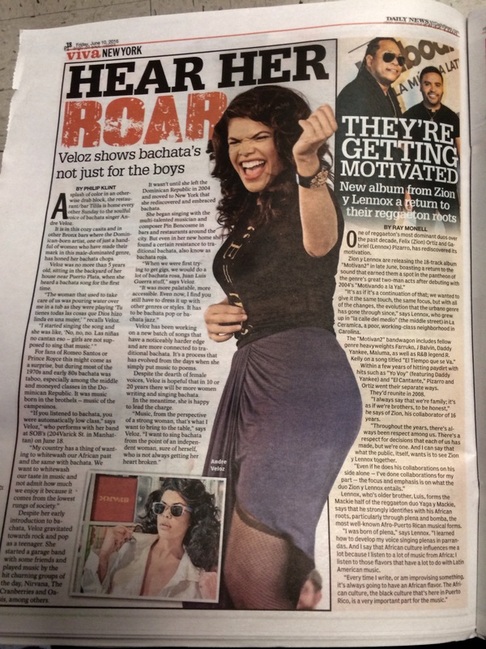 Hear Her Roar: Andre Veloz Shows Bachata's not just for the Boys
Andre Veloz
by Philip Klint
For New York Daily News
Hear Her Roar: Andre Veloz Shows Bachata's not just for the Boys
Andre Veloz
by Philip Klint
For New York Daily News
PHILIP KLINT
VIVA/NEW YORK DAILY NEWS
Wednesday, June 15, 2016, 4:34 PM
A splash of color in an otherwise drab block, the restaurant/bar Tilila is home every other Sunday to the soulful voice of bachata singer Andre Veloz.
It is in this cozy casita and in other Bronx bars where the Dominican-born artist, one of just a handful of women who have made their mark in this male-dominated genre, has honed her bachata chops.
Veloz was no more than 5 years old, sitting in the backyard of her house near Puerto Plata, when she heard a bachata song for the first time.
“The woman that used to take care of us was pouring water over me in a tub as they were playing ‘Tu tienes todas las cosas que Dios hizo linda en una mujer,’ ” recalls Veloz.
“I started singing the song and she was like, ‘No, no, no. Las niñas no cantan eso — girls are not supposed to sing that music.’ ”
For fans of Romeo Santos or Prince Royce this might come as a surprise, but during most of the 1970s and early 80s bachata was taboo, especially among the middle and moneyed classes in the Dominican Republic. It was music born in the brothels — music of the campesinos.
“If you listened to bachata, you were automatically low class,” says Veloz,” who performs with her band at SOB’s (204 Varick St. in Manhattan) on June 18.
“My country has a thing of wanting to whitewash our African past and the same with bachata. We want to whitewash our taste in music and not admit how much we enjoy it because it comes from the lowest rungs of society.”
Despite her early introduction to bachata, Veloz gravitated towards rock and pop as a teenager. She started a garage band with some friends and played music by the hit churning groups of the day, Nirvana, The Cranberries and Oasis, among others.
It wasn’t until she left the Dominican Republic in 2004 and moved to New York that she rediscovered and embraced bachata.
She began singing with the multi-talented musician and composer Pin Bencosme in bars and restaurants around the city. But even in her new home she found a certain resistance to traditional bachata, also know as bachata roja.
“When we were first trying to get gigs, we would do a lot of bachata rosa, Juan Luis Guerra stuff,” says Veloz.
“It was more palatable, more accessible. Even now, I find you still have to dress it up with other genres or styles. It has to be bachata pop or bachata jazz.”
Veloz has been working on a new batch of songs that have a noticeably harder edge and are more connected to traditional bachata. It’s a process that has evolved from the days when she simply put music to poems.
Despite the dearth of female voices, Veloz is hopeful that in 10 or 20 years there will be more women writing and singing bachata.
In the meantime, she is happy to lead the charge.
“Music, from the perspective of a strong woman, that’s what I want to bring to the table,” says Veloz. “I want to sing bachata from the point of an independent woman, sure of herself, who is not always getting her heart broken.”
Philip Klint is an anchor and producer for NY1 Noticias
In It for the Bronx: A New Music Festival, Homegrown in the Borough
TUESDAY, AUGUST 16, 2016 AT 7:45 A.M.
BY BEVERLY BRYAN
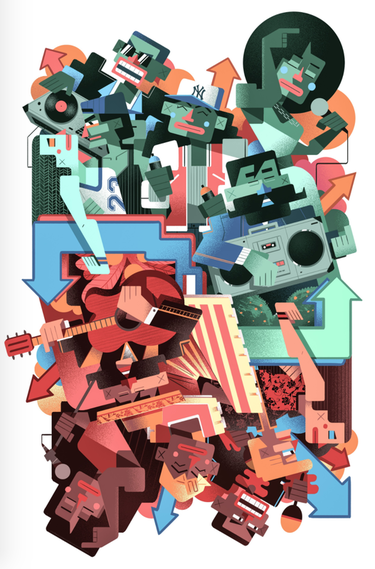
As a young immigrant from the Dominican Republicgrowing up in the Bronx, Dairanys Grullon-Virgil learned English by listening to the early-Aughts hard-rock band Evanescence, but the romantic ballads of bachata kept her connected to her roots. Music was her lifeline, to her old and new homes. Now, as the co-founder of the new Mi Gente! Latinx Music Festival, Grullon-Virgil wants her neighbors to feel that same connection. "I used to look at events like Afropunk or Afro-Latino: You always would have to go to Manhattan, Brooklyn, or Queens to get that kind of experience," she says on a call with the Voice. The young activist was inspired by the way those festivals create dialogue and teaching moments, within and outside a community, through music. She just wanted it for her home borough.
Along with the Bronx painter Laura James, she created a one-day free event to highlight artists who, like her, use music to connect with their cultures and local communities. But the organizers also wanted to "honor women in the diaspora," says Grullon-Virgil. Accordingly, all the acts in the lineup for this inaugural year are fronted by or composed mostly of women; using the gender-neutral term "Latinx" in the title goes a step further to recognize the contributions of gender-nonconforming people and signals that the festival is a safe space.
Considering the natural relationship between community-building and women's agency, the lineup was easy to assemble. The booking philosophy is most clearly represented in Legacy Women, a group that uses Puerto Rican bomba, Dominican palo, and other drumming traditions to connect women across generations and heal trauma. Some of the women, for instance, have written songs about their experiences of domestic violence. "It's empowering to be connected to your cultural practices," says the group's Bronx-born founder and director, Manuela Arciniegas. "We share our version of history through the drum [and] use our music as a vehicle to talk to other women in the community."
The lineup also honors specific heritages. Victoria Tapias sings with BullA en el Barrio, a group that performs bullerengue, a traditional Colombian style of music and movement created by Africans enslaved in Latin America. "It began as women gathering to sing and dance together," Tapias explains, usually with drum accompaniment. "It's a cultural manifestation of how people lived and celebrated life in the Caribbean and Urabá regions of Colombia, where bullerengue started and is still very much alive." Though most members of BullA en el Barrio are Colombian, few had encountered the genre before joining the group. So, she says, "bullerengue unites us and allows us to get to know each other in a different way." She says the experience has been "magical for all of us."
Regardless of style or genre, it can be hard for women to find a space to perform their music. Mi Gente! is attempting to buck that trend, according to Dominican-born Bronx resident Andre Veloz, who will perform her own bachata compositions at the festival. "For women to get gigs is hard, and [Grullon-Virgil] is making a very powerful stand for more women to go on[stage]," the singer-songwriter says. "It's everything that people take for granted: the Bronx, women. It's a very interesting recipe right there."
It's not that the borough is a cultural wasteland — far from it. Hip-hop originated in the Bronx, and the Casita Maria community center has offered arts education for eighty years. There are already free concerts, too: Bronx SalsaFest, SummerStage events, and an annual show from the New York Philharmonic. But the calendar remains sparse, particularly when it comes to a festival that Bronx residents can truly call their own. According to James, the response to Mi Gente! from within the borough reveals a community hungry to create culture for itself: As soon as the festival was announced, artists flooded the organizers with requests to play. "People are very interested," she says, "and want to see this type of thing happen in the Bronx."
Veloz agrees that Bronx residents, many of whom are working-class, have an unmet need: "There is so much going on with just surviving and working and bringing food to the table, but that shouldn't mean we are starved for art, too."
Mi Gente! Latinx Music Festival takes place August 20 at the Point Campus for Arts and Environment (1399 Lafayette Avenue, Bronx). More information at migentelatinxmusicfestival.co
Along with the Bronx painter Laura James, she created a one-day free event to highlight artists who, like her, use music to connect with their cultures and local communities. But the organizers also wanted to "honor women in the diaspora," says Grullon-Virgil. Accordingly, all the acts in the lineup for this inaugural year are fronted by or composed mostly of women; using the gender-neutral term "Latinx" in the title goes a step further to recognize the contributions of gender-nonconforming people and signals that the festival is a safe space.
Considering the natural relationship between community-building and women's agency, the lineup was easy to assemble. The booking philosophy is most clearly represented in Legacy Women, a group that uses Puerto Rican bomba, Dominican palo, and other drumming traditions to connect women across generations and heal trauma. Some of the women, for instance, have written songs about their experiences of domestic violence. "It's empowering to be connected to your cultural practices," says the group's Bronx-born founder and director, Manuela Arciniegas. "We share our version of history through the drum [and] use our music as a vehicle to talk to other women in the community."
The lineup also honors specific heritages. Victoria Tapias sings with BullA en el Barrio, a group that performs bullerengue, a traditional Colombian style of music and movement created by Africans enslaved in Latin America. "It began as women gathering to sing and dance together," Tapias explains, usually with drum accompaniment. "It's a cultural manifestation of how people lived and celebrated life in the Caribbean and Urabá regions of Colombia, where bullerengue started and is still very much alive." Though most members of BullA en el Barrio are Colombian, few had encountered the genre before joining the group. So, she says, "bullerengue unites us and allows us to get to know each other in a different way." She says the experience has been "magical for all of us."
Regardless of style or genre, it can be hard for women to find a space to perform their music. Mi Gente! is attempting to buck that trend, according to Dominican-born Bronx resident Andre Veloz, who will perform her own bachata compositions at the festival. "For women to get gigs is hard, and [Grullon-Virgil] is making a very powerful stand for more women to go on[stage]," the singer-songwriter says. "It's everything that people take for granted: the Bronx, women. It's a very interesting recipe right there."
It's not that the borough is a cultural wasteland — far from it. Hip-hop originated in the Bronx, and the Casita Maria community center has offered arts education for eighty years. There are already free concerts, too: Bronx SalsaFest, SummerStage events, and an annual show from the New York Philharmonic. But the calendar remains sparse, particularly when it comes to a festival that Bronx residents can truly call their own. According to James, the response to Mi Gente! from within the borough reveals a community hungry to create culture for itself: As soon as the festival was announced, artists flooded the organizers with requests to play. "People are very interested," she says, "and want to see this type of thing happen in the Bronx."
Veloz agrees that Bronx residents, many of whom are working-class, have an unmet need: "There is so much going on with just surviving and working and bringing food to the table, but that shouldn't mean we are starved for art, too."
Mi Gente! Latinx Music Festival takes place August 20 at the Point Campus for Arts and Environment (1399 Lafayette Avenue, Bronx). More information at migentelatinxmusicfestival.co
Dominican Bachata Moving from el Campo to the Garden
By Deborah Pacini Hernandez
http://revista.drclas.harvard.edu/book/dominican-bachata
André Veloz, una de las pocas mujeres intérpretes de la bachata tradicional
By Philip Klint
NY1 Noticias en TV
Monday, May 18, 2015 at 11:10 AM EDT
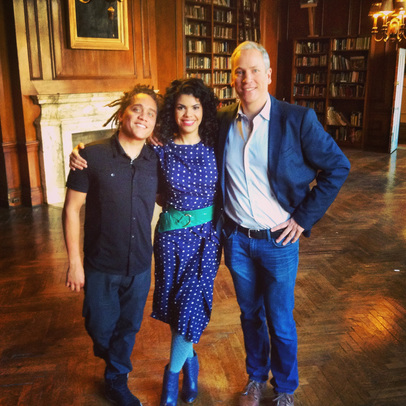 Yasser Tejeda, Andre Veloz y el periodista Philip Klint
Yasser Tejeda, Andre Veloz y el periodista Philip Klint
Es una de las pocas voces femeninas en un género dominado por hombres. Pero André Veloz, ha logrado abrirse camino en el mundo de la bachata a través de sus propias composiciones y una fusión con otros estilos y géneros musicales. Philip Klint nos tiene su historia.
Viene de una familia de abogados. Pero André Veloz nunca se interesó en una carrera en derecho. Su pasión desde chica fue la música, canciones de Madonna, que solía entonar en la regadera de su casa, rock latino y por supuesto el merengue de su país natal.
Nacida en St. Croix en las Islas Vírgenes, Veloz se crió en República Dominicana y es ahí donde poco a poco se fue empapando de lo que se convertiría en su vocación, una de las pocas mujeres intérpretes de la bachata roja o bachata tradicional.
"Cualquier música folklórica de un país tiene que tener un elemento importante para tú cantarla que venga de aquí adentro.Toda la bachata o la mayoría tiene que ver con asuntos del corazón o mal de amor así que gracias todos los novios que me han botado o me han tratado mal porque eso me ha ayudado a poseer las canciones", dijo André Veloz.
Esas canciones no las empezó a poseer hasta mucho más tarde. Y es que para una niña o joven en República Dominicana en los años 80, la bachata era una música prohibida, un tabú, un género no apto para una señorita o una niña decente.
"La bachata viene de los burdeles, tal como el tango, tal como el blues viene de lo más adentro y la gente más desposeída del país que cuando cobraban se iban a las barras y ahí tocaban la bachata así que ya tú sabes, la gente asociaba la bachata con burdel, con mujeres de la vida alegre, con peleas", dijo Veloz.
A pesar de este estigma Veloz dice que la bachata se convertiría en algo como el aire, algo que no podía dejar de oír especialmente después de mudarse a Nueva York en 2001. Ya radicada aquí comenzó a cantar en restaurantes y festivales locales con legendarios músicos como Edilio Paredes, uno de los guitarristas más emblemáticos de la bachata.
Esos jams también se producen hoy en día en su apartamento de El Bronx conocido como la Guarida donde en su tiempo libre no solo pule esas tradicionales canciones de la bachata roja pero además se va abriendo camino como compositora y escritora, fusionando estas canciones tan dominicanas con otros géneros como el jazz.
Veloz dice que la música es difícil de navegar para una mujer especialmente cuando se trata de la bachata, un género prácticamente dominado por el hombre, algo que se ve reflejado en las letras de las canciones.
En efecto son muy pocas las mujeres que han incursionado en el mundo de la bachata, nombres como Melida Rodríguez y Aridia Ventura son la excepción. Lo que se ha propuesto Veloz es no sólo darle un toque femenino al género pero también transformar el mensaje tradicional de estas canciones.
"Música desde la perspectiva de una mujer fuerte, eso es lo que yo quiero traer a la mesa. Yo quiero traer esa bachata desde el punto de vista de una mujer segura de sí misma, independiente que trabaja", dijo Veloz.
Andre Veloz es entrevistada por Phlilip Klint para NY1 noticias. Visita el link y conoce a André Veloz, una de pocas mujeres intérpretes de bachata tradicional bit.ly/1L1DHiX
Andre Veloz is interviewd by Philip Klint for NY1 Noticias. Visit the link below and get to know more of Andre, one of the few female faces in traditional Bachata. bit.ly/1L1DHiX
http://twitter.com/NY1noticias/status/600321925663993856
Click below to easily share or schedule to Twitter, Facebook and LinkedIn:
http://ow.ly/N5Ybh
Viene de una familia de abogados. Pero André Veloz nunca se interesó en una carrera en derecho. Su pasión desde chica fue la música, canciones de Madonna, que solía entonar en la regadera de su casa, rock latino y por supuesto el merengue de su país natal.
Nacida en St. Croix en las Islas Vírgenes, Veloz se crió en República Dominicana y es ahí donde poco a poco se fue empapando de lo que se convertiría en su vocación, una de las pocas mujeres intérpretes de la bachata roja o bachata tradicional.
"Cualquier música folklórica de un país tiene que tener un elemento importante para tú cantarla que venga de aquí adentro.Toda la bachata o la mayoría tiene que ver con asuntos del corazón o mal de amor así que gracias todos los novios que me han botado o me han tratado mal porque eso me ha ayudado a poseer las canciones", dijo André Veloz.
Esas canciones no las empezó a poseer hasta mucho más tarde. Y es que para una niña o joven en República Dominicana en los años 80, la bachata era una música prohibida, un tabú, un género no apto para una señorita o una niña decente.
"La bachata viene de los burdeles, tal como el tango, tal como el blues viene de lo más adentro y la gente más desposeída del país que cuando cobraban se iban a las barras y ahí tocaban la bachata así que ya tú sabes, la gente asociaba la bachata con burdel, con mujeres de la vida alegre, con peleas", dijo Veloz.
A pesar de este estigma Veloz dice que la bachata se convertiría en algo como el aire, algo que no podía dejar de oír especialmente después de mudarse a Nueva York en 2001. Ya radicada aquí comenzó a cantar en restaurantes y festivales locales con legendarios músicos como Edilio Paredes, uno de los guitarristas más emblemáticos de la bachata.
Esos jams también se producen hoy en día en su apartamento de El Bronx conocido como la Guarida donde en su tiempo libre no solo pule esas tradicionales canciones de la bachata roja pero además se va abriendo camino como compositora y escritora, fusionando estas canciones tan dominicanas con otros géneros como el jazz.
Veloz dice que la música es difícil de navegar para una mujer especialmente cuando se trata de la bachata, un género prácticamente dominado por el hombre, algo que se ve reflejado en las letras de las canciones.
En efecto son muy pocas las mujeres que han incursionado en el mundo de la bachata, nombres como Melida Rodríguez y Aridia Ventura son la excepción. Lo que se ha propuesto Veloz es no sólo darle un toque femenino al género pero también transformar el mensaje tradicional de estas canciones.
"Música desde la perspectiva de una mujer fuerte, eso es lo que yo quiero traer a la mesa. Yo quiero traer esa bachata desde el punto de vista de una mujer segura de sí misma, independiente que trabaja", dijo Veloz.
Andre Veloz es entrevistada por Phlilip Klint para NY1 noticias. Visita el link y conoce a André Veloz, una de pocas mujeres intérpretes de bachata tradicional bit.ly/1L1DHiX
Andre Veloz is interviewd by Philip Klint for NY1 Noticias. Visit the link below and get to know more of Andre, one of the few female faces in traditional Bachata. bit.ly/1L1DHiX
http://twitter.com/NY1noticias/status/600321925663993856
Click below to easily share or schedule to Twitter, Facebook and LinkedIn:
http://ow.ly/N5Ybh
La Galería Magazine interviews Andre Veloz
Andre Veloz is that cool.
“Almost all bachatas are written for men.I wanna make the point that ‘Hey, there are no bachatas written for a woman’”. She certainly reflects this in her music, her songs are indeed a much-needed woman’s voice in a genre dominated by men.
Enjoy the complete interview at interview at "La Galería Magazine" by visiting link below:
http://www.lagaleriamag.com/andre-veloz-la-bachatera-transforming-the-genre/
“Almost all bachatas are written for men.I wanna make the point that ‘Hey, there are no bachatas written for a woman’”. She certainly reflects this in her music, her songs are indeed a much-needed woman’s voice in a genre dominated by men.
Enjoy the complete interview at interview at "La Galería Magazine" by visiting link below:
http://www.lagaleriamag.com/andre-veloz-la-bachatera-transforming-the-genre/
Bachatera Andre Veloz ruge nuevamente
Para la cantautora Andre Veloz el año 2016 no ha estado corto de buenas noticias.
Desde Bachatear en el Carnegie Hall, una residencia artistica los Domingos en Tilila Bar and Grill, a ser destacado en publicaciones tal como Revista de la Universidad de Harvard, una entrevista publicada en “La Galería” E-zine y más recientemente, el artículo por Philip Klint para el N.Y. Daily News “Andre Veloz Shows Bachatha’s not just for the Boys” (Andre Veloz nos demuestra que la bachata no es solo para varones).
Una vez más Andre se lanza a un terreno dominados por hombres: Cuisine TV shows. Esta vez la Afro Dominicana nacida en St. Croix será guía en el Bronx para el Famoso Chef y trotamundos Andrew Zimmern en su programa Bizarre Foods.
Andre Veloz, residente del Bronx desde el 2004 y es una orgullosa representante de este condado. Como digna Bachatera, invitará a Zimmerman en un recorrido en el que comerán desde “Bandera” (arroz, habichuela y carne) en un billar, hasta mollejitas con guineitos en un puesto de local de frituras.
“Me enorgullece el Bronx. Defiendo el Bronx, que es el condado más desposeído de Nueva York. Es por eso que me alegra poder mostrar el Bronx verdadero: Un lugar lleno de diversidad donde que miles de mujeres y hombres luchadores llaman su hogar. No es el Bronx horroroso que Hollywood ha vendido”.
El episodio del Bronx de Bizarre Foods será transmitido este martes 12 de Julio a las 9:00 pm a través de Travel Channel.
Desde Bachatear en el Carnegie Hall, una residencia artistica los Domingos en Tilila Bar and Grill, a ser destacado en publicaciones tal como Revista de la Universidad de Harvard, una entrevista publicada en “La Galería” E-zine y más recientemente, el artículo por Philip Klint para el N.Y. Daily News “Andre Veloz Shows Bachatha’s not just for the Boys” (Andre Veloz nos demuestra que la bachata no es solo para varones).
Una vez más Andre se lanza a un terreno dominados por hombres: Cuisine TV shows. Esta vez la Afro Dominicana nacida en St. Croix será guía en el Bronx para el Famoso Chef y trotamundos Andrew Zimmern en su programa Bizarre Foods.
Andre Veloz, residente del Bronx desde el 2004 y es una orgullosa representante de este condado. Como digna Bachatera, invitará a Zimmerman en un recorrido en el que comerán desde “Bandera” (arroz, habichuela y carne) en un billar, hasta mollejitas con guineitos en un puesto de local de frituras.
“Me enorgullece el Bronx. Defiendo el Bronx, que es el condado más desposeído de Nueva York. Es por eso que me alegra poder mostrar el Bronx verdadero: Un lugar lleno de diversidad donde que miles de mujeres y hombres luchadores llaman su hogar. No es el Bronx horroroso que Hollywood ha vendido”.
El episodio del Bronx de Bizarre Foods será transmitido este martes 12 de Julio a las 9:00 pm a través de Travel Channel.
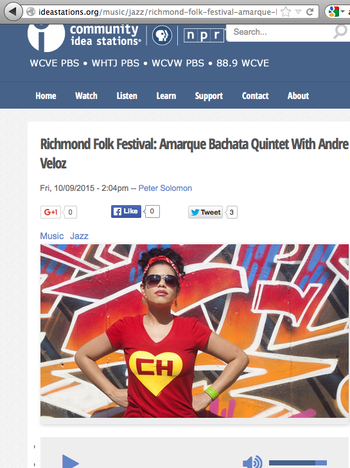 Andre Veloz for RVA Community Idea Stations
Andre Veloz for RVA Community Idea Stations
Richmond Virginia Community Idea Stations
Bachata was music of the working class, traditionally sung by men who lived in the countryside and barrios of the Dominican Republic. As a female bachata singer, Andre Veloz defies traditional conventions and tries to bring recognition and respect to what she sees as a neglected and marginalized art form.
88.9 WCVE’s Peter Solomon reports.
Enjoy the complete interview at:
http://ideastations.org/music/jazz/richmond-folk-festival-amarque-bachata-quintet-andre-veloz
Bachata was music of the working class, traditionally sung by men who lived in the countryside and barrios of the Dominican Republic. As a female bachata singer, Andre Veloz defies traditional conventions and tries to bring recognition and respect to what she sees as a neglected and marginalized art form.
88.9 WCVE’s Peter Solomon reports.
Enjoy the complete interview at:
http://ideastations.org/music/jazz/richmond-folk-festival-amarque-bachata-quintet-andre-veloz
Amargue Bachata Quintet with Andre Veloz
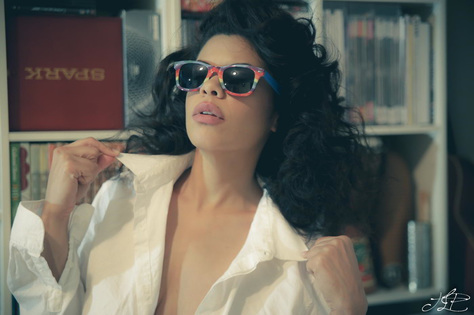 Andre Veloz
Bachata
Andre Veloz
Bachata
New York City is home to the largest Dominican population in the United States, and a new bachata star, Andre Veloz, has emerged from this thriving community. Bachata is guitar-driven music that mines themes of pain and heartbreak. As a leading female voice in what has traditionally been a male-dominated genre, Veloz is staking a claim for a leading role as a bachatera. “The Dominican community in the U.S. has a big responsibility to bring bachata out of the margins,” says Veloz. Hopeful that more women singers will gain recognition in the genre, Veloz is redrawing bachata’s boundaries while honoring its history.
Bachata was born in the rural countryside of the Dominican Republic, and developed in its poor and working class barrios. In the 1970s and 1980s, the style emerged as distinct from bolero and merengue, other older Dominican styles that blend Spanish and African influences. Originally called bolero campesino(“peasant love song”), bachata is often referred to as musica de amargue. “Amargue”means bitterness, and when applied to Dominican music, it describes the bittersweet emotions of love, especially unrequited love. In Veloz’s words, “Bachata is sensual, it gets to your heart.”
Veloz was born in St. Croix and grew up in the Cibao region of the Dominican Republic. Always a performer, in pre-school she was once caught serenading classmates from a tabletop, and as a teenager she sang with rock and jazz groups. . Growing up, she heard snippets of bachata, but this music of heartbroken and hard-luck men was not considered suitable for women to listen to – let alone sing. When Veloz moved to New York City in 2004, the sounds of bachata were all around her: on the subway and drifting from apartment windows in the Bronx. In this Dominican diaspora community environment, she began singing “old-school bachata with a twist.” She sought out bachata guitar master Edilio Paredes, a seminal figure who had helped forge the bachata style and distinguish it from its predecessor bolero. When Paredes decided to leave New York and move back home, he connected Veloz with his star protégé, bachata guitar virtuoso Frank Mendez. Mendez performed with such masters as Ramón Cordero and Puerto Plata, in addition to his work as a member of the group La Familia Paredes.
Joining Veloz and Mendez in the Amargue Bachata Quintet are Pin Bencosme (guitar), John Chapman (bass), Ramon Del Rosario (congas), and Joel Guzman (güira). With Andre Veloz’s beautiful voice at the fore of this fine ensemble, festivalgoers will no doubt be charmed by bachata as it makes its festival debut. Veloz invites you to “go with your heart open to accept the music, and bring good shoes to dance.”
http://www.richmondfolkfestival.org/docs/2015_performers_02/amarguebachata.html
Bachata was born in the rural countryside of the Dominican Republic, and developed in its poor and working class barrios. In the 1970s and 1980s, the style emerged as distinct from bolero and merengue, other older Dominican styles that blend Spanish and African influences. Originally called bolero campesino(“peasant love song”), bachata is often referred to as musica de amargue. “Amargue”means bitterness, and when applied to Dominican music, it describes the bittersweet emotions of love, especially unrequited love. In Veloz’s words, “Bachata is sensual, it gets to your heart.”
Veloz was born in St. Croix and grew up in the Cibao region of the Dominican Republic. Always a performer, in pre-school she was once caught serenading classmates from a tabletop, and as a teenager she sang with rock and jazz groups. . Growing up, she heard snippets of bachata, but this music of heartbroken and hard-luck men was not considered suitable for women to listen to – let alone sing. When Veloz moved to New York City in 2004, the sounds of bachata were all around her: on the subway and drifting from apartment windows in the Bronx. In this Dominican diaspora community environment, she began singing “old-school bachata with a twist.” She sought out bachata guitar master Edilio Paredes, a seminal figure who had helped forge the bachata style and distinguish it from its predecessor bolero. When Paredes decided to leave New York and move back home, he connected Veloz with his star protégé, bachata guitar virtuoso Frank Mendez. Mendez performed with such masters as Ramón Cordero and Puerto Plata, in addition to his work as a member of the group La Familia Paredes.
Joining Veloz and Mendez in the Amargue Bachata Quintet are Pin Bencosme (guitar), John Chapman (bass), Ramon Del Rosario (congas), and Joel Guzman (güira). With Andre Veloz’s beautiful voice at the fore of this fine ensemble, festivalgoers will no doubt be charmed by bachata as it makes its festival debut. Veloz invites you to “go with your heart open to accept the music, and bring good shoes to dance.”
http://www.richmondfolkfestival.org/docs/2015_performers_02/amarguebachata.html
De un pájaro las dos patas 2: las décimas del amargue y otras canciones de amor
Article by Raquel Z. Rivera
for 80grados.net
Is you are looking for a solid read that will certainly enrich your Bachatopedia? If yes, then I encourage you to take some time and visit this article of talented fellow singer Raquel Z. Rivera.
She has graciously included my singing and brought up my respect for the Puerto Rican contribution to Bachata and Musica de Amargue. Hope you enjoy is as much as I did.
http://www.80grados.net/de-un-pajaro-las-dos-patas-2-las-decimas-del-amargue-y-otras-canciones-de-amor/
for 80grados.net
Is you are looking for a solid read that will certainly enrich your Bachatopedia? If yes, then I encourage you to take some time and visit this article of talented fellow singer Raquel Z. Rivera.
She has graciously included my singing and brought up my respect for the Puerto Rican contribution to Bachata and Musica de Amargue. Hope you enjoy is as much as I did.
http://www.80grados.net/de-un-pajaro-las-dos-patas-2-las-decimas-del-amargue-y-otras-canciones-de-amor/
Behind the Scenes at the American Folk Festival. Artist Spotlight-Andre Veloz.
By Dan Cashman
Guest post by Renee Fournier
http://folkfest.bangordailynews.com/2015/08/07/home/artist-spotlight-andre-veloz/
 Andre Veloz,
Photo by Rachel Rednor
Andre Veloz,
Photo by Rachel Rednor
Part Latin hip hop, part blues with a bit of jazz thrown in for flavor, Bachata music often was denigrated by the elite in the Dominican Republic as being associated with rural underdevelopment and crime.Like rap in the United States, Bachata began as a music of the poor and dispossessed.
Veloz first remembers hearing Bachata music while taking showers, using a bucket, in the backyard of her Dominican Republic home.She has vivid memories of her grandmother dancing around the house and yard to the music.
Originating in the shantytowns of the Dominican Republic, it reflects the social and economic dislocation of the poorest Dominicans.Derived from the Latin American tradition of guitar music, Bachata emerged in the 1960s only to be denigrated by the media, mainstream musicians, and middle- and upper-class Dominicans. Its lyrics were often about hard drinking, women troubles, illicit sex, and male bravado and the music was considered vulgar and useless by some.
By the 1980s, the music had spread around the world and came to be appreciated for its social importance and its musical technicality.
Veloz first remembers hearing Bachata music while taking showers, using a bucket, in the backyard of her Dominican Republic home.She has vivid memories of her grandmother dancing around the house and yard to the music.
Originating in the shantytowns of the Dominican Republic, it reflects the social and economic dislocation of the poorest Dominicans.Derived from the Latin American tradition of guitar music, Bachata emerged in the 1960s only to be denigrated by the media, mainstream musicians, and middle- and upper-class Dominicans. Its lyrics were often about hard drinking, women troubles, illicit sex, and male bravado and the music was considered vulgar and useless by some.
By the 1980s, the music had spread around the world and came to be appreciated for its social importance and its musical technicality.
Since those early days of hearing Bachata music, Veloz has become a noted vocalist in New York City and has worked hard breaking into the male-dominated world of Dominican Bachata.
She plays gigs throughout the city, combining traditional Bachata with a bit of influence from the likes of Ella Fitzgerald.
In her biography, she references a Spanish saying, “De musicos, poetas y locos todos tenemos un poco,” which is loosely translated to mean that, “we are all part musician and poet and just a little bit crazy.”Veloz hopes she has an extra tablespoon of all three.
To help support her music career, Veloz teaches in the New York City school system.
The Bachata music industry is largely dominated by men and Veloz is dedicated to finding a place in the genre for women.“I want to show the younger girls who listen to my music that you can go beyond the standard love songs. I think I have something important to say, and I hope that I can reach some ears. I want to leave a legacy that a woman can survive in this industry and genre, and I want women to keep striving for that. It’s not easy,” she said.
Her performances are guaranteed to open your eyes, move your feet and send you home just a bit more familiar with culture of the Dominican Republic and the true message behind Bachata music.
Renee volunteers for the American Folk Festival, sits on the Board at the Bangor Humane Society and lives in Bangor with her husband.
She plays gigs throughout the city, combining traditional Bachata with a bit of influence from the likes of Ella Fitzgerald.
In her biography, she references a Spanish saying, “De musicos, poetas y locos todos tenemos un poco,” which is loosely translated to mean that, “we are all part musician and poet and just a little bit crazy.”Veloz hopes she has an extra tablespoon of all three.
To help support her music career, Veloz teaches in the New York City school system.
The Bachata music industry is largely dominated by men and Veloz is dedicated to finding a place in the genre for women.“I want to show the younger girls who listen to my music that you can go beyond the standard love songs. I think I have something important to say, and I hope that I can reach some ears. I want to leave a legacy that a woman can survive in this industry and genre, and I want women to keep striving for that. It’s not easy,” she said.
Her performances are guaranteed to open your eyes, move your feet and send you home just a bit more familiar with culture of the Dominican Republic and the true message behind Bachata music.
Renee volunteers for the American Folk Festival, sits on the Board at the Bangor Humane Society and lives in Bangor with her husband.
THE STATE OF WOMEN IN BACHATA: AN INTERVIEW WITH ANDRE VELOZ
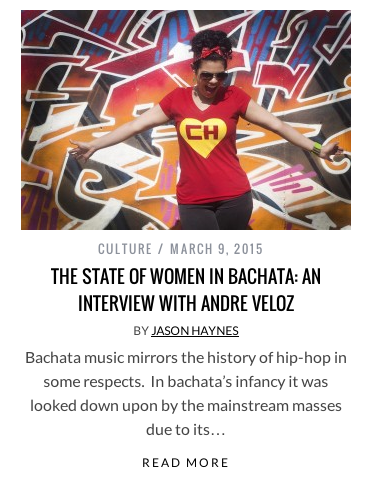 Andre Veloz
LatinDanceCommunity.com
Jason Haynes
Andre Veloz
LatinDanceCommunity.com
Jason Haynes
Bachata music mirrors the history of hip-hop in some respects. In bachata’s infancy it was looked down upon by the mainstream masses due to its racy and machismo tinged lyrics, and low socioeconomic culture from which it was rooted. In 1992, Juan Luis Guerra received a Grammy for his album Bachata Rosa, and he did for bachata, what Run DMC did for rap; he moved bachata towards being a respected genre...However, if historical inventory is taken on the genres most popular songs and groups you would find that female artists are rarely in the spotlight... Andre Veloz is an aspiring bachatera hoping to help woman change this unfortunate inequality.
Her grandmother was a talented dancer and was often spotted by Andre dancing to bachata. The music was very prevalent in the community even if the people didn’t like to admit it due to its negative connotation in the culture. These experiences coupled with her singing talents and love for the music led Andre to pursuit a career as a bachatera. Andre began singing as a very young child and admits she was a little bossy with her talent.
Andre – "My mother says I first sang before talking. As a little kid many people would ask me to take a break so I would stop singing. I remember performing shows in preschool and forcing the kids to watch me."
I really had a lot of fun during while being interviewed by Jason Haynes. A good reminder that music,all that revolves around the arts and life itself is meant to be enjoyable and uplifting.
Want to find out more about that? Please visit the link below to LatinDanceCommunity.Com's complete interview and of course, enjoy!
http://latindancecommunity.com/woman-bachata-andre-veloz/
Her grandmother was a talented dancer and was often spotted by Andre dancing to bachata. The music was very prevalent in the community even if the people didn’t like to admit it due to its negative connotation in the culture. These experiences coupled with her singing talents and love for the music led Andre to pursuit a career as a bachatera. Andre began singing as a very young child and admits she was a little bossy with her talent.
Andre – "My mother says I first sang before talking. As a little kid many people would ask me to take a break so I would stop singing. I remember performing shows in preschool and forcing the kids to watch me."
I really had a lot of fun during while being interviewed by Jason Haynes. A good reminder that music,all that revolves around the arts and life itself is meant to be enjoyable and uplifting.
Want to find out more about that? Please visit the link below to LatinDanceCommunity.Com's complete interview and of course, enjoy!
http://latindancecommunity.com/woman-bachata-andre-veloz/
Andre Veloz en 90.3 F.M The Voice of Harlem
Bachata: Two Generations Carry on Playing Music from Dominican Republic
December 13, 2012 · 12:00 PM CST
Reporter Bruce Wallace (follow)
Host Marco Werman (follow)
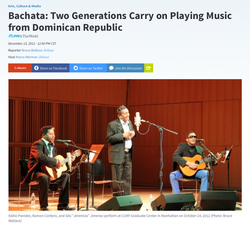
A recent concert in New York City brought two generations of musicians together to pay homage to bachata, a style of music born in the Dominican countryside more than 50 years ago...Two generations of bachata musicians gathered to pay homage to the classic style of the music–an acoustic, earthy brand that comes from the Dominican Republic's rural north. That's where guitarist Edilio Paredes and singer Ramon Cordero started playing it in the 1950s, and where singer Andre Veloz first heard it many years later.
"It was like a vulgar, poor-people music," singer Andre Veloz said. "And now everybody sings it, and now everybody enjoys it. And even now, people who say they don't do, because they are too fine for it, still do it."
Veloz shared the stage with Paredes and Cordero in New York. She's in her 20s, and lives in the Bronx now. She grew up in the Dominican countryside not far from where the two bachata elder statesmen are from. Music by them and other classic bachateros played around the house while she was growing up.
"And that is what the maids used to put all day—bachata bachata—old styles, old school, very cool. And I remember everybody was like 'Aw stop listening to that, that's not for ladies.'" Andre Veloz says that she always has to fight against that not-for-ladies stereotype. "It's just very disappointing and frustrating. And I really hope that very soon more places will open for more women–not only in bachata, but in Latin music in general. And, yeah, I'm looking forward to being part of that."=
"It was like a vulgar, poor-people music," singer Andre Veloz said. "And now everybody sings it, and now everybody enjoys it. And even now, people who say they don't do, because they are too fine for it, still do it."
Veloz shared the stage with Paredes and Cordero in New York. She's in her 20s, and lives in the Bronx now. She grew up in the Dominican countryside not far from where the two bachata elder statesmen are from. Music by them and other classic bachateros played around the house while she was growing up.
"And that is what the maids used to put all day—bachata bachata—old styles, old school, very cool. And I remember everybody was like 'Aw stop listening to that, that's not for ladies.'" Andre Veloz says that she always has to fight against that not-for-ladies stereotype. "It's just very disappointing and frustrating. And I really hope that very soon more places will open for more women–not only in bachata, but in Latin music in general. And, yeah, I'm looking forward to being part of that."=
This concert, this terrific interview by Bruce Wallace, the whole thing has been one of the more humbling experiences in my life and in my career as a Bachatera. For me, this was like having the opportunity to share the stage with the Bachata's Beatles, or Rolling Stones: Edilio Paredes and Ramon Cordero (whom my grandma still has a crush on). I will be always in debt to Benjamin De Menil from IASO records, to Bruce Wallace, to Marco Werman, to PRI's The World and to Live@365: A global music series World Music Series for listening to what we had to share about Bachata and helping us spread the good word about the Dominican Blues.
I encourage you to Please (pretty please) listen to the complete interview and concert by following the link below PRI's The World. Enjoy.
I encourage you to Please (pretty please) listen to the complete interview and concert by following the link below PRI's The World. Enjoy.
http://www.pri.org/stories/2012-12-13/bachata-two-generations-carry-playing-music-dominican-republic
Andre Veloz en el Daily News "Andre Veloz Shows Bachata is not for the Boys" by Philip Klint
Amargue Bachata Quintet with Andre Veloz
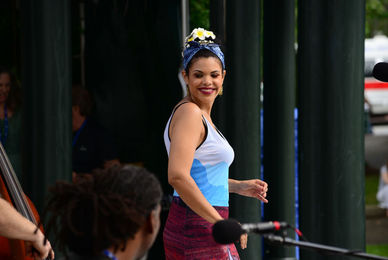 TOM PICH
Andre Veloz. Amargue Bachata Quintet with Andre Veloz. Dominican bachata. New York City is home to the largest Dominican population in the United States, and a new bachata star, Andre Veloz, has emerged from this thriving community. Bachata is guitar-driven music that mines themes of pain and heartbreak. As a leading female voice in what has traditionally been a male-dominated genre, Veloz is staking a claim for a leading role as a bachatera. “The Dominican community in the U.S. has a big responsibility to bring bachata out of the margins,” says Veloz. Hopeful that more women singers will gain recognition in the genre, Veloz is redrawing bachata’s boundaries while honoring it s history.
TOM PICH
Andre Veloz. Amargue Bachata Quintet with Andre Veloz. Dominican bachata. New York City is home to the largest Dominican population in the United States, and a new bachata star, Andre Veloz, has emerged from this thriving community. Bachata is guitar-driven music that mines themes of pain and heartbreak. As a leading female voice in what has traditionally been a male-dominated genre, Veloz is staking a claim for a leading role as a bachatera. “The Dominican community in the U.S. has a big responsibility to bring bachata out of the margins,” says Veloz. Hopeful that more women singers will gain recognition in the genre, Veloz is redrawing bachata’s boundaries while honoring it s history.
Posted: Wednesday, September 30, 2015 2:40 pm
Genre: Dominican bachata
Location: New York, New York
New York City is home to the largest Dominican population in the United States, and a new bachata star, Andre Veloz, has emerged from this thriving community. Bachata is guitar-driven music that mines themes of pain and heartbreak. As a leading female voice in what has traditionally been a male-dominated genre, Veloz is staking a claim for a leading role as a bachatera. “The Dominican community in the U.S. has a big responsibility to bring bachata out of the margins,” says Veloz. Hopeful that more women singers will gain recognition in the genre, Veloz is redrawing bachata’s boundaries while honoring its history.
Bachata was born in the rural countryside of the Dominican Republic, and developed in its poor and working class barrios. In the 1970s and 1980s, the style emerged as distinct from bolero and merengue, other older Dominican styles that blend Spanish and African influences. Originally called bolero campesino (“peasant love song”), bachata is often referred to as musica de amargue. “Amargue” means bitterness, and when applied to Dominican music, it describes the bittersweet emotions of love, especially unrequited love. In Veloz’s words, “Bachata is sensual, it gets to your heart.”
Veloz was born in St. Croix and grew up in the Cibao region of the Dominican Republic. Always a performer, in pre-school she was once caught serenading classmates from a tabletop, and as a teenager she sang with rock and jazz groups. . Growing up, she heard snippets of bachata, but this music of heartbroken and hard-luck men was not considered suitable for women to listen to – let alone sing. When Veloz moved to New York City in 2004, the sounds of bachata were all around her: on the subway and drifting from apartment windows in the Bronx. In this Dominican diaspora community environment, she began singing “old-school bachata with a twist.” She sought out bachata guitar master Edilio Paredes, a seminal figure who had helped forge the bachata style and distinguish it from its predecessor bolero. When Paredes decided to leave New York and move back home, he connected Veloz with his star protégé, bachata guitar virtuoso Frank Mendez. Mendez performed with such masters as Ramón Cordero and Puerto Plata, in addition to his work as a member of the group La Familia Paredes.
Joining Veloz and Mendez in the Amargue Bachata Quintet are Pin Bencosme (guitar), John Chapman (bass), Ernesto Maldonado (congas, bongos), and Joel Guzmán (güira). With Andre Veloz’s beautiful voice at the fore of this fine ensemble, festivalgoers will no doubt be charmed by bachata as it makes its festival debut. Veloz invites you to “go with your heart open to accept the music, and bring good shoes to dance.”
Genre: Dominican bachata
Location: New York, New York
New York City is home to the largest Dominican population in the United States, and a new bachata star, Andre Veloz, has emerged from this thriving community. Bachata is guitar-driven music that mines themes of pain and heartbreak. As a leading female voice in what has traditionally been a male-dominated genre, Veloz is staking a claim for a leading role as a bachatera. “The Dominican community in the U.S. has a big responsibility to bring bachata out of the margins,” says Veloz. Hopeful that more women singers will gain recognition in the genre, Veloz is redrawing bachata’s boundaries while honoring its history.
Bachata was born in the rural countryside of the Dominican Republic, and developed in its poor and working class barrios. In the 1970s and 1980s, the style emerged as distinct from bolero and merengue, other older Dominican styles that blend Spanish and African influences. Originally called bolero campesino (“peasant love song”), bachata is often referred to as musica de amargue. “Amargue” means bitterness, and when applied to Dominican music, it describes the bittersweet emotions of love, especially unrequited love. In Veloz’s words, “Bachata is sensual, it gets to your heart.”
Veloz was born in St. Croix and grew up in the Cibao region of the Dominican Republic. Always a performer, in pre-school she was once caught serenading classmates from a tabletop, and as a teenager she sang with rock and jazz groups. . Growing up, she heard snippets of bachata, but this music of heartbroken and hard-luck men was not considered suitable for women to listen to – let alone sing. When Veloz moved to New York City in 2004, the sounds of bachata were all around her: on the subway and drifting from apartment windows in the Bronx. In this Dominican diaspora community environment, she began singing “old-school bachata with a twist.” She sought out bachata guitar master Edilio Paredes, a seminal figure who had helped forge the bachata style and distinguish it from its predecessor bolero. When Paredes decided to leave New York and move back home, he connected Veloz with his star protégé, bachata guitar virtuoso Frank Mendez. Mendez performed with such masters as Ramón Cordero and Puerto Plata, in addition to his work as a member of the group La Familia Paredes.
Joining Veloz and Mendez in the Amargue Bachata Quintet are Pin Bencosme (guitar), John Chapman (bass), Ernesto Maldonado (congas, bongos), and Joel Guzmán (güira). With Andre Veloz’s beautiful voice at the fore of this fine ensemble, festivalgoers will no doubt be charmed by bachata as it makes its festival debut. Veloz invites you to “go with your heart open to accept the music, and bring good shoes to dance.”
http://www.richmond.com/events/richmond-folk-festival/performers/article_ad4f8226-67a2-11e5-8c37-074e264b62d3.html
Colores Latinos TV presenta: Andre Veloz, Edilio Paredes and Trio Amargue. Fragments of The Lowell Folk Festival.
Published on Aug 26, 2014 By Nancy Peña
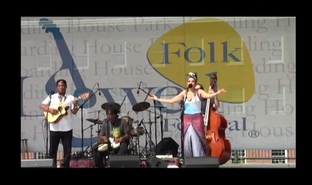
Colores Latinos TV, (CLTV) es un programa bilingual, mensual, disenado para la comunidad hispana y transmitido en mas de 28 canales locales en New England. CLTV promueve temas de: Salud, Educacion y Cultura.
Our gratitude goes to Nancy Peña, host and producer of Colores Latinos for the interest on featuring in our art and music in Colores Latinos TV.Follow link below to see this episode of "Colores Latinos". Should you want to view our performance solely, we are featured around the minute 30 of the Program.
https://www.youtube.com/watch?v=c9AqGI8ONsY
Our gratitude goes to Nancy Peña, host and producer of Colores Latinos for the interest on featuring in our art and music in Colores Latinos TV.Follow link below to see this episode of "Colores Latinos". Should you want to view our performance solely, we are featured around the minute 30 of the Program.
https://www.youtube.com/watch?v=c9AqGI8ONsY
Bachata-Uprising by Salsa-Uprising.COM
Press and Blogs on Andre Veloz
http://www.salsa-uprising.com/album/cabare-bachata/
Yey! Andre Veloz and her Cabaret Bachata were featured on Web-zine and Blog Salsa-Uprising.
Curated and created by David Diaz, Salsa-uprising.com this Web-zine is dedicated to educate and spread valuable information about Latin music and culture. Referring to Andre Veloz in this Blog entry "While Andre Veloz is very much a part of that NYC bachata scene, she contributes her own saucy, fanciful and feminine sensibility. Says she: “We female bachata singers are like Unicorns. People think we are a myth, but WE DO EXIST!"
It continues "Andre Veloz was kind enough to provide Salsa Uprising with extra tracks not available for purchase on Cabare Bachata; the last two tracks on this album are separate from the actual Cabare Bachata album. (The second to last track, Why don't you do right. 2002, is priceless anyway! a rarity!) Don't be shy about supporting Andre. Visit her album page on iTunes and give support to this local artist from the Bronx ;)"
Mi gente please visit salsa-uprising.com for more details on this and other awesome entries. To David: Gracias mi querido.
http://www.salsa-uprising.com/album/cabare-bachata/
Curated and created by David Diaz, Salsa-uprising.com this Web-zine is dedicated to educate and spread valuable information about Latin music and culture. Referring to Andre Veloz in this Blog entry "While Andre Veloz is very much a part of that NYC bachata scene, she contributes her own saucy, fanciful and feminine sensibility. Says she: “We female bachata singers are like Unicorns. People think we are a myth, but WE DO EXIST!"
It continues "Andre Veloz was kind enough to provide Salsa Uprising with extra tracks not available for purchase on Cabare Bachata; the last two tracks on this album are separate from the actual Cabare Bachata album. (The second to last track, Why don't you do right. 2002, is priceless anyway! a rarity!) Don't be shy about supporting Andre. Visit her album page on iTunes and give support to this local artist from the Bronx ;)"
Mi gente please visit salsa-uprising.com for more details on this and other awesome entries. To David: Gracias mi querido.
http://www.salsa-uprising.com/album/cabare-bachata/
|
EXCLUSIVE: Grandmaster Flash tops final list of performers at this year’s Richmond Folk Festival
By COLLEEN CURRAN Richmond Times-Dispatch Hip-hop DJ Grandmaster Flash, master of the turntable and pioneer of hip-hop, will be performing at this year’s Richmond Folk Festival. He’s just one of the many final performers announced for the Richmond Folk Festival, including Brazilian tap dancer Leonardo Sandoval and big band free jazz ensemble Sun Ra Arkestra. Forty musical groups in all will be performing at this year’s festival. Eight represent styles of music that have never been performed at the festival, such as Jewish cantorial music, Ethiojazz and qawwali, a form of Sufi devotional music that is popular in South Asia. “Our festival is a multicultural experience like no other,” said festival director Lisa Sims. “We’re so proud to bring performers that most Richmonders may never have seen or even heard of before.” Bolivian culture and traditions also will be highlighted in the Virginia Folklife Program. According to organizers, Virginia is home to the largest Bolivian-born population in the country. Be sure to stick around Saturday night for the Tinku dance group Fraternidad Cultural Pachamama. After their performance, more than 100 Bolivian dancers will disembark from the Folklife Stage and parade through the festival to the Altria Main Stage. “This is truly going to be a dazzling spectacle and unprecedented for us,” Sims said. In addition to the free performances at the three-day festival Oct. 9-11, many of the performers will visit public schools the week before the festival. For the full article by Colleen Curran for The Richmonnd Times Dispatch visit link below. http://www.richmond.com/entertainment/article_1270b7c5-527a-5a33-9941-36eeabed827e.html Grand Master Flash, Sun Ra Arkestra headlines 2015 Richmond Folk Festival - full line up released (with videos) http://rvamag.com/articles/full/25048/grand-master-flash-sun-ra-arkestra-headlines-2015-richmond-folk-festival-full |
